FOCUS industry































































































































































































































































Private Healthcare






Diplomacy&Trade presents, for the first time, a focus on the private healthcare sector in Hungary; the services and offers available to corporate and individual clients. In the lead article, György Leitner, President of PRIMUS Private Health Service Providers Association talks about the state of the sector, its role in the Hungarian health care system, the relationship between public and private health care, and the strict quality assurance practices of providers.
see compilation on pages 12-16

For Better Capitalism


































































The President-CEO of the World Business Council for Sustainable Development (WBCSD) Peter Bakker gave a presentation on 'Making stakeholder capitalism real and rewarding' to nearly a hundred CEOs at the General Assembly of the Business Council for Sustainable Development in Hungary (BCSDH), emphasizing the importance of private enterprise and competitive markets. see more on page 18
PIONEERING THE COVID VACCINES




















































































































HUNGARIAN BIOCHEMIST KATALIN KARIKÓ OVERCAME NUMEROUS PROFESSIONAL SETBACKS BEFORE SHOOTING TO STARDOM AS ONE OF THE INVENTORS OF THE MRNA TECHNOLOGY USED IN TWO COVID-19 VACCINES. THE SCIENTIST TALKED TO DIPLOMACY&TRADE ABOUT HER LOVE FOR SCIENCE, THE OUTCOME OF THE PANDEMIC AND THE CURING POWER OF HER INVENTION
SEE INTERVIEW ON pages 08-09
APRIL 2021 HUF 1710 EUR 6

YOU CAN SUBSCRIBE TO OUR NEWSLETTER








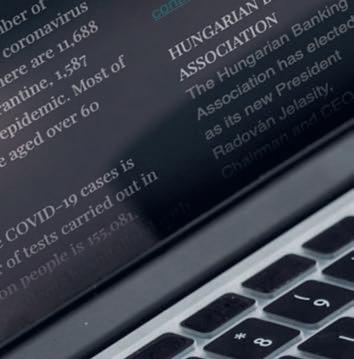







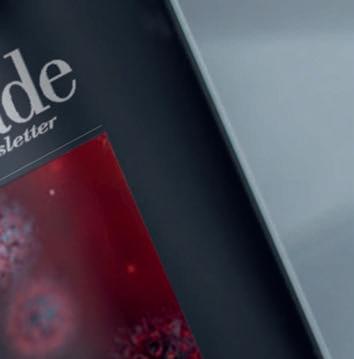
BY READING THIS QR CODE WITH YOUR SMARTPHONE AND FILL IN YOUR DETAILS



letter from the publisher
The last Hungarian-born laureate of the Nobel Prize was Avram (Ferenc Ábrahám) Hershko who received this recognition in 2004. There is a growing consensus that he could be followed on this prestigious list of 13 names by biochemist Dr. Katalin Karikó as one of the inventors of the mRNA technology used in two COVID-19 vaccines. She gave an interview for Diplomacy&Trade in which she modestly says that “the fact that I became a famous person overnight is really the result of the work of many people over many decades.”
As a presidential candidate, Joe Biden repeatedly criticized Donald Trump for neglecting multilateral approach to important issues in the world. As the first major international initiative by the new administration, the United States breathed new life into the Quad group of the Asia-Pacific region to strengthen cooperation with Australia, India and Japan to counter the expansion of China, our international analyst explains.
The topic we focus in this edition is the private healthcare sector in Hungary. As you can learn from the head of the country’s private healthcare providers’ association, it is important that they can express their views, for instance, on how state provision and private care should supplement each other because they believe there is synergy between these two rather than competition.
"Even committed capitalists are beginning to argue that capitalism, in its current form, is unsustainable – socially, environmentally, and economically," the President of the World Business Council for Sustainable Development states in his interview with our paper, saying that his organization helps making a better capitalism real and rewarding for business.
This month, WittyLeaks is authored by the Thai ambassador who believes that “life is like a camera, just focus on what is important and capture the good times.” And that is what he, a passionate photographer, does in Hungary, too. Our gastronomy page explains a new strategic partnership between a worldrenowned chef and the Matild Palace Budapest while the wine section is about Hungarian viticulturist Vilmos Thummerer winning a precious gold medal at the Chardonnay world championship in France. The pace of vaccines being administered to the Hungarian population is picking up steam. Hopefully, this will result in improved statistics of new cases. Please, keep up your vigil, follow safe practices and avoid becoming a statistic.
Peter Freed PUBLISHER
cont en ts
18 SUSTAINABILITY
For Building a Real and Rewarding Capitalism
PUBLISHER: Peter Freed EDITOR: Sándor Laczkó PHOTO EDITOR: Dávid Harangozó
SALES & MARKETING DIRECTOR: Tamás Varga ADMINISTRATION: Éva Madarász
CONTRIBUTORS: Sándor Laczkó, Tamás Magyarics, Edith Balázs, Bhakavat Tanskul
PHOTO CONTRIBUTORS: depositphotos (Cover), László Mudra, AIPS Media, hetenyikorhaz.hu, labiennale.org, depositphotos.com, Budapest Airport, Vodafone, Audi Hungaria, MIHŐ, coca-colahellenic.com, myerste.hu, mobility.siemens.com, © BioNTech SE 2021, all rights reserved, Courtesy of Katalin Karikó, Ádám Béres, Dr. Rose Private Hospital, Tungsram, WBCSD, The Embassy of Thailand, Bhakavat Tanskul, Szilvia Szigeti, Árpád Horváth, Artemis Productions, VeszprémFest, Gábor Kotschy/Müpa, Marco Bollinger, Matild Palota, Thummerer Winery, MTI Photos: Balázs Mohai
Dr.
The Quad alliance versus China 12-16 PRIVATE HEALTHCARE

Interview with the President of the PRIMUS Private Healthcare Providers Association, György Leitner; Dr. Rose Private Hospital; Affidea Gastroenterology Center
17 INNOVATION
IT Innovation Award of the Hungarian Innovation Grand Prix for Tungsram
19 CHAMBER
President of the Italian Chamber of Commerce for Hungary passes away 20 WITTYLEAKS by the Ambassador of Thailand
21 WHAT’S ON Concerts, festivals, events and exhibitions in and out of Budapest
22 GASTRONOMY
Wolfgang Puck strategic partnership with Matild Palace


23 WINE
Hungarian Gold Medal at the Chardonnay du Monde


DUTCH FOCUS – COMING SOON

In its June issue, Diplomacy&Trade – in cooperation with the Dutch Embassy in Budapest –presents a special Focus section on relations between Hungary and the Netherlands as the two countries have recently celebrated the 100th anniversary of establishing diplomatic relations. The Netherlands is one of the major distribution and logistics centers in Europe and an important trading partner for Hungary. The combined trade balance of the two countries is about EUR 7 billion. Ever since Hungary became a member of the EU, the number and volume of Dutch investments have increased significantly. Currently, there are over 800 Dutch ventures in Hungary. The special section includes an extensive interview with Ambassador René van Hell discussing economic ties, cultural and civilian cooperation. We also talk to the Netherlands-Hungarian Chamber of Commerce in Budapest.

APRIL 2021 |DIPLOMACY & TRADE| www.dteurope.com 4 Copyright 2004-2020 DUAX Kft., all rights reserved | ISSN 1589-8075 This magazine is produced by DUAX Kft. The opinions published in the magazine do not necessarily reflect the opinions of DUAX Kft. photo by THUMMERER WINERY, VESZPRÉMFEST, MATILD PALOTA, DEPOSITPHOTOS.COM We welcome inquires for advertising in this issue. PLEASE CALL TAMÁS VARGA FOR FURTHER INFORMATION +36 209 350 250 - tvarga@budapestweek.com AND DON’T FORGET monthly in print - daily on the web www.dteurope.com COPIES ARE AVAILABLE AT SELECTED RELAY AND INMEDIO OUTLETS IN MAJOR HUNGARIAN CITIES. NEWSSTAND PRICE: HUF 1,710 or EUR 6 - Subscriptions are available for an annual fee of EUR 72 in Hungary, or EUR 90 to all other destinations. SEND REQUESTS AND INQUIRIES TO DUAX KFT. H-1034 Budapest, Bécsi út 60. TELEPHONE [+36-70] 320-3051 | FAX [+36-1] 350-5660 E-MAIL editor@dteurope.com | ADVERTISING tvarga@budapestweek.com 05 ON THE RECORD 06-07 COMPANY BRIEFS 08-09 EXECUTIVE WORLD
Interview with
Katalin Karikó 10 ANALYSIS
Wolfgang Puck Fine Dining Group strategic partnership with Matild Palace Budapest page
22
In July, Sir Tom Jones will take the stage in the Veszprém Arena page 21
Hungarian Gold Medal at the Chardonnay du Monde contest page 23
MARCH 15,HUNGARY'S NATIONALDAY

Due to the new coronavirus epidemic, the flag-raising ceremony in front of Parliament was the only on-thespot event on this year’s national holiday schedule, the Day of Remembrance of the Revolution and War of Independence of 1848-49.
That was followed by President János Áder's ceremonial speech broadcast by the public media. In his speech, referring to the coronavirus epidemic, the President of the Republic asked the question “are we better able than ever to unite against a force that threatens our lives and freedoms, bringing pain and death among us?”
According to János Áder, the fight becomes personal when the trouble is already knocking on our door. “Are we extinguishing the fire of the epidemic with the simple decision of vaccinating ourselves, or are we remaining victims and helplessly waiting for something miraculous to happen to us? Can we act for our country, for our families, for our communities, for our neighbors, for the freedom of all of us, do we take our share of the responsibility for the defense?”
on the record
"for their foundational contributions to theoretical computer science and discrete mathematics, and their leading role in shaping them into central fields of modern mathematics." The theory of ‘computational complexity’ – which concerns itself with the speed and efficiency of algorithms – first emerged in the 1970s and is now an established field of both mathematics and theoretical computer science. Computational complexity is now a very important field, providing the theoretical basis for internet security. Today, algorithms and internet security applications are an integral part of everyday life for all of us. The work of László Lovász and Avi Wigderson has played an important part in this development, the Academy says.
A statement by the Abel Prize committee calls László Lovász "a brilliant mathematician since his teens", who has more than delivered on his early promise. His work has established connections between discrete mathematics and computer science. Born in 1948 in Budapest, Hungary, he has also served his community as a writer of books, noted for their clarity and accessibility, as an inspirational lecturer, and as a leader, spending a term as president of the International Mathematical Union (2007–2010). Between 2014 and 2020, he was President of the Hungarian Academy of Sciences.
László Lovász has won many awards including the 1999 Wolf Prize, the 1999 Knuth Prize, the 2001 Gödel Prize and the 2010 Kyoto Prize.

90%FALLINTHENUMBER OFTOURISMNIGHTSIN HUNGARY
UPCOMING NATIONAL DAYS
April
May
HUNGARIANGOVERNMENT URGESHOMEOFFICEUSE
The use of a home office will also help curb the epidemic, so the government is asking companies to allow their employees to work from home, Tamás Schanda, Parliamentary and Strategic Secretary of State at the Ministry of Innovation and Technology (ITM) said.

The fewer encounters, the harder the epidemic can spread, so it’s very important that whoever can do it should work from home. The home office is important not only because of the slowdown of the epidemic, but also in many families, kindergarten and school children do not have to be entrusted to anyone else, the parents can stay with them, the deputy minister added.
Tamás Schanda reminded that "in order to be able to open later, we must close now. Everyone is needed in the fight against the epidemic. Please follow the rules, because only then can we succeed together," he said.
HUNGARIANRECIPIENT OFTHE'NOBELPRIZEOF MATHEMATICS'
The Norwegian Academy of Science and Letters awarded the Abel Prize for 2021 to Hungary's László Lovász of the Alfréd Rényi Institute of Mathematics (ELKH, MTA Institute of Excellence) and Eötvös Loránd University in Budapest and Israel's Avi Wigderson of the Institute for Advanced Study, Princeton, USA

As a result of border crossing restrictions and Covid-19 protection measures for commercial accommodation, domestic tourists spent 86% fewer tourism nights in commercial accommodation establishments (hotels, boarding houses, camping sites, bungalow complexes and community hostels) compared to the same period of the previous year. International guests spent 94% fewer nights. As the Central Statistical Office reports, 66% of all tourism nights were spent by domestic guests. The number of domestic tourism nights increased by 11,000 compared to the previous month. Total gross sales of commercial accommodation establishments, calculated at current prices, were 91% lower than in January of the previous year.
YOUNGHUNGARIANWINS INTERNATIONALSPORTS PHOTOGRAPHYAWARD
Anna Szilágyi's picture 'European Champions' has been chosen as the best at the AIPS Sport Media Awards of the International Association of Sports Journalists in the category of photojournalists under the age of 30.
"The European Waterpolo Championship was a great experience, it was my first official international work. There were three photographers working at the event and I was glad I ended up by the pool because I knew good photos could be taken from there," Anna Szilágyi said. The AIPS Sport Media Awards are the highest international accolade in the sport media industry. They offer recognition to the very best sport storytellers across all media platforms, from photography to video, from print to digital, from podcasts to sports blogs. Based on the premise that sport is a valuable tool for education and culture, and with a network of 160 countries, AIPS, as the internationally-recognized body for sports journalism says it looks to celebrate those professionals who continue to produce the best, most creative content worldwide.

17Syria Independence Day
18Zimbabwe Independence Day
27South Africa Freedom Day
30Netherlands National Day
3Poland National Day
17Norway National Day
25Jordan Independence Day
26Georgia National Day
CANADIANMANBEQUEATHSCAD 300,000 TOSZOLNOKHOSPITAL
A Canadian Hungarian man left 300,000 Canadian dollars to the Foundation for the Géza Hetényi Hospital in Szolnok, E Hungary. The amount was intended for the cardiology department of the institution.
An announcement sent to the state news agency MTI quotes Miklós Piroska, director general of the health care institution, who said that the honorary consul of Alberta, Sándor Szenthe, contacted the hospital from Canada and said that a Canadian Hungarian, István Gulácsi left a significant amount to the Géza Hetényi Hospital Foundation in his will.
Béla Herczeg, chief physician of the hospital's cardiology department, told MTI that the amount will be used for cardiology care. Theyintend to modernize the electronic system of the department by buying computers, printers and other related equipment. Plans include the purchase of an ultrasound device, defibrillators, and a Holter device (an electronic device used for heart rate analysis), he said.
István Gulácsi was born in 1924 in Szolnok. He emigrated to Canada in 1949 with his wife, Erzsébet and settled in Edmonton, living in a happy marriage for 64 years. The couple regularly traveled home to Hungary. The decision to donate a larger amount to the cardiology department stems from the fact that his wife had been treated in the cardiology department of the hospital for years.
OSCARS:ACTRESSINHUNGARIAN DIRECTOR'SMOVIENOMINATED

British actress Vanessa Kirby was announced as one of the five candidates for the 2021 Academy Awards in 'Actress in a leading role' for her performance in 'Pieces of a woman' by Hungarian director Kornél Mundruczó.

32-year-old Vanessa Kirby is best known for her portrayal of Princess Margaret in the television series 'The Crown' (2016-2018), for which she won the 'BAFTA Award for Best Actress in a Supporting Role in a Television Series'.
Pieces of a Woman is Kornél Mundruczó’s first English-language feature. It was selected for competition at 77th Venice International Film Festival. It is a deeply personal, searing domestic aria in exquisite shades of grey and an ultimately transcendent story of a woman learning to live alongside her loss.
The Hungarian director is known for his movie ‘Jupiter’s Moon’ that competed for the Palme d'Or in the main competition section at the 2017 Cannes Film Festival. His film ‘White God’ won the main prize of the Un Certain Regard program at the 67th Cannes Film Festival.
Honoring movies released in 2020, the Academy Awards ceremony – without on-thespot audience – will be held at Union Station Los Angeles and the Dolby Theatre at the Hollywood & Highland Center on Sunday, April 25, 2021.
www.dteurope.com |DIPLOMACY & TRADE| APRIL 2021 5 photo by BALÁZS MOHAI/MTI, DEPOSITPHOTOS.COM, LÁSZLÓ MUDRA, AIPS MEDIA, HETENYIKORHAZ.HU, LABIENNALE.ORG
company briefs
BUDAPEST AIRPORT JOINS GLOBAL QUALITY ASSURANCE SYSTEM

NEW GENERATION PETROL ENGINE TO BE MADE IN HUNGARY

The recently established Stellantis Group, as the fourth largest automotive conglomerate in the world, is bringing the manufacturing of the new generation 1.6-liter petrol engines to Szentgotthárd, SW Hungary.
The engine, which is designed for hybrid cars, will be produced at a yearly output of 200,000 units, in addition to the production of 350,000 units of 1.2-liter petrol engines every year. Series production will start in the first half of 2023. The related capacity improvement, which is envisaged to be about 50%, will lead to a considerable growth in headcount, as compared to the current staff of 800 employees. The Hungarian government is to provide a hitherto undisclosed amount of cash subsidy.
Stellantis was formed this January through the merger of the Italian-American Fiat Chrysler Automobiles and the French PSA automotive concern. Stellantis has factories in more than 30 countries, giving work to over 400,000 people around the world. The Group is engaged in the manufacturing of 14 brands, among others Fiat, Chrysler, Opel, Peugeot, Citroën, Jeep, Maserati and Alfa Romeo, and has set it as an objective to take the lead in sustainable mobility.
As the Hungarian Investment Promotion Agency reports, the plant in Szentgotthárd, having been involved in engine manufacturing for 28 years, made a shift at the beginning of January 2020. It adapted its production and assembly lines to the manufacturing of the 1.2-liter 3-cylinder turbo PSA EB petrol engines and EP cylinder heads, with the former having earned the title ‘Engine of the Year’ four times already. With this, the plant has practically replaced its earlier manufacturing portfolio, and today the factory in Szentgotthárd is one of those units among the Stellantis plants in Europe that produce 1.2-liter PureTech petrol engines, at a yearly capacity of 350,000 units.
The main engine components, notably the crankshaft, the crank chamber and the cylinder head, will be processed in Szentgotthárd, and this will be the assembly and testing site for the engines too. The production of the new engines will require the conversion of the current production lines. The majority of the design and execution processes will be implemented in-house by the factory's own engineers and experts.
Budapest Airport is introducing a quality assurance system encompassing all phases of pharmaceutical transportation in Hungary, with the management of the International Air Transport Association (IATA). The aim of the project, launched together with freight forwarder, transporter and ground handling companies, is to ensure that medical supplies should reach their targets under strictly controlled circumstances, quickly and safely, assuring quality during the entire transportation process, a press statement explains. The past year highlighted more than ever before that the pharmaceutical and medical sector relies greatly on the air freight industry. Not just during a global pandemic, but under all circumstances it is important that medical supplies should be forwarded from the sender to the recipient as quickly as possible, always strictly ensuring an environment that will preserve their quality. Budapest Airport has therefore decided to introduce the CEIV Pharma pharmaceutical logistics standard in Hungary, with the professional guidance of IATA. The quality assurance process will be introduced based on IATA’s developments and the GDP system used by the European Union and the WHO in such a way that it should also comply fully with Hungarian regulations.
Budapest Airport’s partners, forwarders Agility, Airmax Cargo and cargo-partner, road transporter Prevost and ground handling companies Celebi and Menzies have also joined the CEIV Pharma quality assurance system in Hungary. As part of this, regulations include developing these companies’ facilities, assets and processes, as well as the further training of employees. Thus, all steps within the pharmaceutical
logistics process can be implemented under controlled and assured circumstances. “Medical supplies – medical equipment and pharmaceutical products – have come into the focus of attention all over the world during the past year. However, pharmaceutical logistics is of key importance not only during a global pandemic; that is why we decided to safeguard it in the framework of a new quality assurance system that pharmaceuticals should get to where they are needed even faster and under stricter safe conditions,” Dr. Rolf Schnitzler, the CEO of Budapest Airport is quoted in the statement as saying. “Such a large project can only be implemented in cooperation with all those involved in the supply chain; on behalf of Budapest Airport, I would therefore like to thank IATA and our partners from the cargo community for the support,” he added.
VODAFONE 5G SERVICE EXTENDED IN BUDAPEST
Vodafone is the first among domestic service providers to enable 5G connection to its customers in the majority of the residential areas of Budapest: 5G has been connected to more than 200 base stations in the capital and in the surrounding metropolitan area.
Vodafone has also announced that by the end of the first quarter of this year, 5G will be turned on nationwide at nearly 300 base stations, making the next generation mobile network available in other major cities and towns.
Vodafone's outdoor 5G network is now available for customers in most of the capital. The company says the introduction of 5G in Hungary is associated with Vodafone: in May 2019, a permanent base station was launched at the Zala Zone Automotive Test Track for its opening and then another one on top of Vodafone Hungary headquarters in Budapest on its own frequency. The next milestone in Vodafone’s 5G developments came in the fall of 2019, when the service provider launched the country’s first open-air commercial 5G network – thus making the benefits of 5G widely available.

Developments did not come to a halt despite the pandemic. The service provider launched its 5G service in several rural cities, such as Siófok, Székesfehérvár and Miskolc. Rural development will continue in the following months.
Vodafone Hungary also took 5G to the field of education last year: the service provider signed a cooperation agreement with
the Budapest University of Technology and Economics (BME), which provides 40 MHz of its own frequency set for the establishment and operation of a pilot 5G network and 5G Laboratory at the University.
"With regard to 5G developments, Hungary stands out not only in Europe but in the whole world. I am proud to say that Vodafone Hungary is also at the forefront of the development of the new generation network among domestic service providers, as is exemplified by our current announcement. The development of our networks is of utmost importance, as they make it possible to do telework and distance learning, to run businesses – whether they are the largest manufacturing companies or small and medium-sized enterprises. As for the future, Hungary needs the best networks available for the rapid restoration of the economy and to ensure a successful business and social environment – this is what our 5G developments are for," the CEO of Vodafone Hungary, Amanda Nelson said.
AUDI: THE 250,000TH Q3 MODEL MANUFACTURED IN GYŐR
The 250,000th Audi Q3 model rolled off the production line in Győr this March. The anniversary car was a tango-red Audi Q3 Sportback with plug-in hybrid drive, which was heading to Germany.

"The success story of the Audi Q3 began in our company in 2018. Since then, it has been the model produced in the largest number of units, which we also manufacture with combustion engine, mild hybrid and plug-in hybrid drive. Thanks to the expertise and dedicated work of my colleagues, every model we produce represents premium quality and our passion for cars," Board Member for Vehicle Production at Audi Hungaria, Les Zoltán pointed out.
in 2019, production of the Audi Q3 Sportback also began and then received the prestigious ‘Best Cars’ award in the compact SUV/off-road vehicles category in 2020. In keeping with Audi Hungaria's traditions, an RS version of these models is also produced, powered by a 2.5-liter five-cylinder engine from Győr.
Last year, the company produced a total of 155,157 cars, including 94,659 Q3 and 47,232 Q3 Sportback models built by employees in Győr. Thanks to the rise of electromobility, the company has already produced more than 24,000 mild hybrids and 480 plug-in hybrids in 2020. The largest markets for the Q3 model family last year were the United States, Germany and Italy, a company press release said.
In addition to the Q3 models, Audi Hungaria's vehicle production includes the Audi TT Coupé and TT Roadster models.
6
photo by DEPOSITPHOTOS.COM, BUDAPEST AIRPORT, VODAFONE, AUDI HUNGARIA
APRIL 2021 |DIPLOMACY & TRADE| www.dteurope.com
company briefs
AUTOWALLIS TO ACQUIRE MOST MODERN CAR DEALERSHIP

AutoWallis announced this March that it will gain possession of one of the largest and most modern BMW dealerships in Central and Eastern Europe, housed in a building boasting unparalleled architectural solutions in the Hungarian capital. Having concluded an agreement on the acquisition of DALP Ltd., the company owning the property at 95 Hungária körút in Budapest, AutoWallis Plc., will be further expanding its selfowned real estate portfolio. The property had already been in use by a subsidiary of the group, as Wallis Motor Pest has been renting it since 2016 when it opened one of the largest and most modern dealerships for BMW and MINI vehicles in Central and Eastern Europe, housed in a building with a floor area of more than 5,000 square meters and boasting unparalleled architectural solutions. Commenting on the transaction, AutoWallis CEO Gábor Ormosy emphasized that one of the important goals of the move was to increase shareholder value, given that the further expansion of the group’s real estate portfolio with a strategically located site will support the corporation’s automotive retail and related services. The CEO added that since the majority of dealerships operated by the group were self-owned, the development and resulting increase in value of such properties would be realized within AutoWallis.
The purchase price of HUF 1.54 billion for DALP Ltd. was determined by an independent appraiser, and will be paid by AutoWallis relying exclusively on its own shares.
As is known, AutoWallis announced in December last year its plans to triple its 2018 revenue in 2021. In addition to organic development, the stock exchange automotive company intends to achieve this substantial growth through the six acquisitions and business developments announced last year. For the purpose of financing its growth plans, at the end of last year, the company carried out a capital increase of HUF 1.4 billion with the participation of three renowned Hungarian institutional investors.
SOCIAL BANKING PROGRAM AT ERSTE BANK

Erste Group announced to help socially beneficial businesses in Central and Eastern Europe during the coronavirus epidemic with interest-subsidized loan. The Erste Group's Social Banking program helps companies in Central and Eastern Europe that do socially useful work by providing them with an emergency working capital loan at which the interest is paid by the Erste Foundation in 2021, according to a press release by the bank. The funding option, originally launched in May 2020, aims to support non-profit organizations, mainly in the health and social care sector. In response to demands from organizations, the Erste Group extended the program until September 2021. Together with emergency working capital loans, the Erste Group lent EUR 14 million in 2020 to more than a hundred socially beneficial businesses.
“Erste Bank Hungary's Social Banking program is proud of its customers, who not only stick to their goals, but are also brave to do business in difficult times. As a partner, Erste Social Banking helped them with the COVID loan, which supported the organizations' finances with an interest rebate,” Orsolya Szalay, Head of Social Banking at Erste Bank said.
Socially beneficial businesses have used interest-free credit to provide support to the most vulnerable groups in their communities, even during a coronavirus epidemic, the bank’s statement says.
FULLY CARBON-NEUTRAL OPERATION AT PANNERGY
The Hungarian geothermal energy company PannErgy says it has been able to replace the emission of more than half a million tons of carbon dioxide with green heat production. As a green energy producer, PannErgy highlights that it has long been one of the major players at the forefront of zero emission energy production in the Hungarian energy industry. The company would like to actively contribute to the achievement of the objectives defined in the Paris Agreement on climate change by joining voluntary projects in which small emissions resulting from current operations are compensated for in the form of Guarantees of Origin (GOs) and carbon credits. In practice, this can be achieved by acquiring Scope 1 and Scope 2 emission levels of the Greenhouse Gas Protocol. At the start of 2021, PannErgy decided not to keep the current track of its operational development focusing on environmental protection and sustainability but to aim for the highest level, a fully carbon-neutral operation. In order to achieve total carbon neutrality, from the start of business year 2021, PannErgy Group is not only analyzing its own situation, but also actively reacts to all material divergence from the carbon neutral position. Accordingly, the company supplies the electricity necessary for the operation of its machines and equipment, such as well pumps and other surface equipment, from renewable energy sources, and also aims to neutralize the carbon emission of the vehicles used by the Group.
PannErgy compensates for its Scope 1 emission levels by acquiring 57 VCUs (Verified Carbon Units), and for its Scope 2 emissions, by acquiring a Guarantee of Origin representing 23,000 MWh of electricity produced. VCUs have obtained internationally recognized “Verified Carbon Standard” certification.
MAJOR COCA-COLA INVESTMENT IN HUNGARY

Coca-Cola HBC Hungary is launching an investment with a total cost amounting approximately to HUF 30 billion in Dunaharaszti, south of Budapest, as a result of which the Hungarian plant will become the largest Central European Manufacturing center of the Coca-Cola system by the end of 2025.

Coca-Cola established its operation in Hungary in 1993, and currently it has 12 sites and two plants located in Dunaharaszti and Zalaszentgrót. The Group distributes more than 100 different products, 90% of which are produced in Hungary.
In the framework of the investment announced this week, the company will implement a capacity extension project in a value of HUF 20 billion, and further investments in a value of HUF 10 billion aiming at promoting its sales activities.
As a first step in 2021, the company will install industrial robots to its headquarters in Dunaharaszti, which is also known as the largest food industry warehouse in Hungary, in order to support the warehousing operations in compliance with the Industry 4.0 era.
SIEMENS MOBILITY TO TRIPLE R&D HEADCOUNT IN HUNGARY
Siemens Mobility will create 120 new research and development (R&D jobs) in its Budapest office in order to implement the 'Digitalization of track-based transport modes', by increasing the number of those employed in this field to 169. The development of driving IT systems, operational security diagnostics, and engineering systems allowing flexible configuration of the railway operations will be implemented by an investment totaling more than EUR 10.3 million, the Hungarian Investment Promotion Agency reports.
Siemens Mobility has been a leader for transport solutions for more than 160 years and has been constantly enhancing its portfolio. Siemens Mobility Ltd. is a separately managed company owned by Siemens with core areas of manufacturing of rolling stock, rail automation and electrification, turnkey systems, intelligent traffic systems as well as related servicing activities.

Siemens has been part of transport in Hungary for more than 130 years and has taken an active part in the development of advanced city infrastructure and community transport since the launch of the first tram in Budapest in 1887. By now, with digitalization, Siemens Mobility enables mobility operators worldwide to make infrastructure intelligent, increase value sustainably over the entire product life cycle, enhance the passenger experience and guarantee availability.
Thanks to the new research and development project, one of Germany's major Groups will focus the activities of its Budapest office in the future on the digitalization of the track-based transport modes in Budapest. The company had always been in the forefront in construing and applying state-of-the art solutions, therefore, it has recently directed its developments towards digitalization and IoT (Internet of Things). The collaborators of the Hungarian development center take part in developing future-oriented products and technical solutions that will be put in everyday practice in railway transport in the coming 5-10 years.
www.dteurope.com |DIPLOMACY & TRADE| APRIL 2021 7 photo by DEPOSITPHOTOS.COM, MIHŐ, COCA-COLAHELLENIC.COM, MYERSTE.HU, MOBILITY.SIEMENS.COM
PIONEERING THE COVID VACCINES
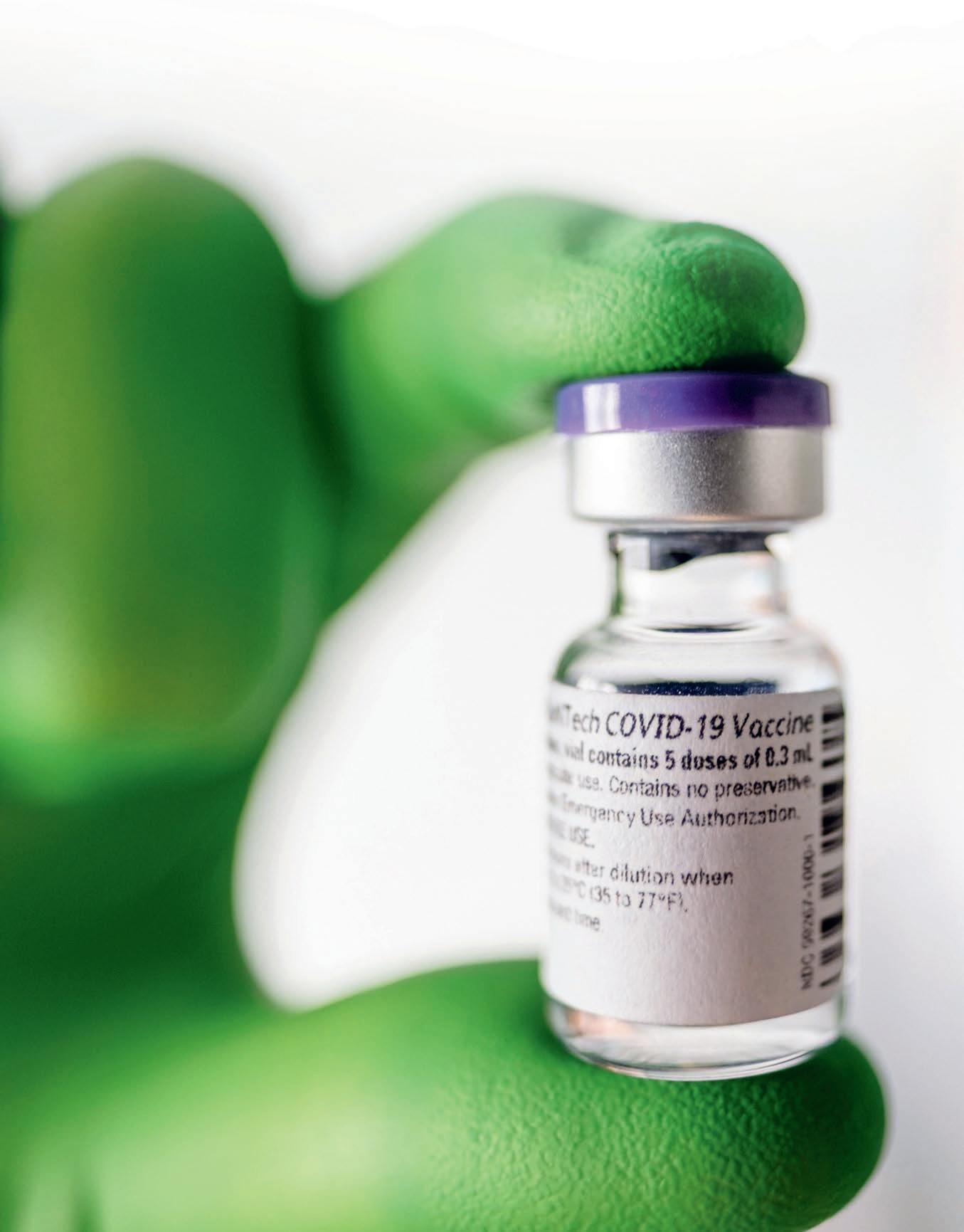
Hungarian biochemist
Katalin Karikó overcame numerous professional setbacks before shooting to stardom as one of the inventors of the mRNA technology used in two COVID-19 vaccines. The scientist, who has been slated as a recipient of the Nobel Prize, talked to Diplomacy&Trade about her love for science, the outcome of the pandemic and the curing power of her invention.
8 photo by © BIONTECH SE 2021, ALL RIGHTS RESERVED AND COURTESY OF KATALIN KARIKÓ
APRIL 2021 |DIPLOMACY & TRADE| www.dteurope.com
executive world
INTERVIEW WITH RENOWNED BIOCHEMIST KATALIN KARIKÓ
executive world
over many decades,” she said in an exclusive interview with Diplomacy&Trade.
The Pfizer/BioNTech and the Moderna vaccines are both based on the discovery of the mRNA she made with her colleague Drew Weissman and published in 2005. Together with Weissman, she holds U.S. patents for application of non-immunogenic, nucleosidemodified RNA. This technology was licensed by BioNTech and Moderna to develop their COVID-19 vaccines. “Although RNA was discovered 60 years ago, scientists couldn’t make messenger RNA until 1984-1985. If the coronavirus pandemic emerged 20 years ago, we would have to battle it in a very different manner. There was no gene synthesis at that time; everybody would have needed physical samples from the Chinese colleagues,” Dr. Karikó noted.
Unbroken resolve
The name Katalin Karikó became known worldwide in a matter of weeks as one of the scientists whose work helped pave the way for the Pfizer/ BioNTech and the Moderna coronavirus vaccines. The underlying technology in both is messenger RNA (mRNA), a single-stranded nucleic acid molecule that delivers genetic instructions to the cell’s protein-making factories. In the case of these vaccines, the molecule tells the cells to start producing the harmless spike protein of the virus that teaches the immune system how to take up the fight against the coronavirus. These vaccines help create antibodies and so-called ‘killer cells’ that travel around the body, recognize the virus and the infected cells and eliminate them.
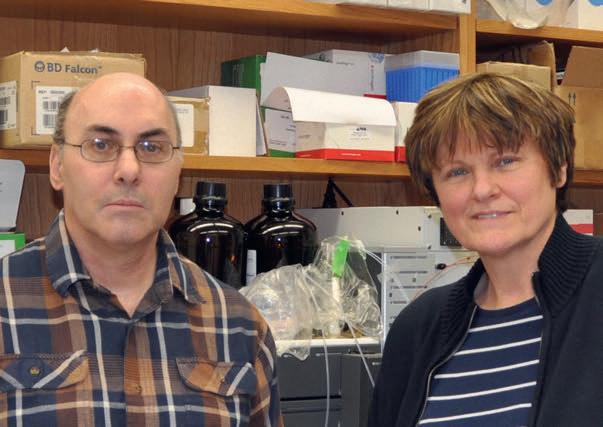
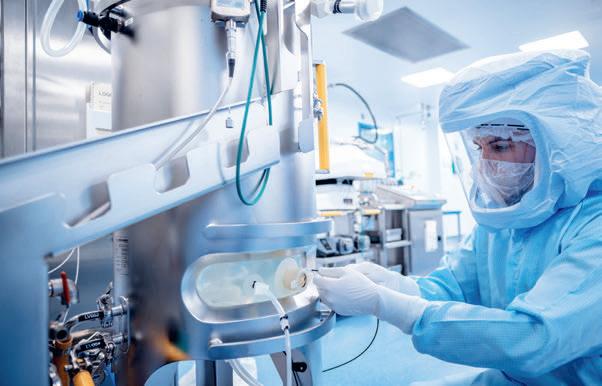
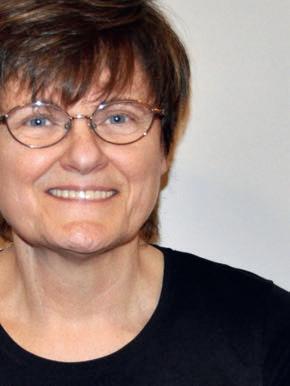
Innate modesty
When asked how she felt about being world famous, her answer shed light on her innate modesty. “It seems like a surprise to me. So many people contributed to the success of these vaccines. My fellow scientists at BioNTech, experts at Pfizer and Moderna, all of them played crucial roles in the process. The fact that I became a famous person overnight is really the result of the work of many people
Karikó grew up in Kisújszállás, Hungary as the daughter of a butcher. “Back in those days, going to the well to get water was the pinnacle of social interaction; that was our chatroom.” After earning her Ph.D. at the University of Szeged, Karikó continued her research and postdoctoral studies at the Institute of Biophysics of the Biological Research Center of Hungary. The researcher received the pink slip in 1985 after the research institute cut costs and reduced staff. In response, she and her husband decided to move to the United States, bought one-way tickets for the three-member family, sewed all their GBP 900 in their daughter’s teddy bear as it was illegal to take such a ‘large’ sum out of the country and left Hungary behind.
For her entire career, Dr. Karikó has focused on mRNA. Despite a series of professional setbacks, she never lost her resolve to continue her research and she remained convinced mRNA could be used to instruct cells to make their own medicines, including vaccines. In 1989, she began working at the University of Pennsylvania, where she spent the next 24 years doing research. Germany’s BioNTech offered Dr. Karikó a job in 2013. She admitted to having spent long nights crying herself to sleep in her apartment in Germany,
tormented by uncertainties whether it was the right move to make. She is now the senior vice president of the company that teamed up with Pfizer to develop the world's first COVID-19 vaccine. Her research and specializations include mRNA-based gene therapy, RNAinduced immune reactions, molecular bases of ischemic tolerance and treatment of brain ischemia. “As long as I’m in the laboratory, I know I’m at home. My husband used to say ‘you are going to the lab not to work but to have fun’. Science is truly uplifting, it is a source of endless joy,” she said.
person is believed to be right,” Katalin Karikó pointed out. The fact that the mRNA vaccines boast a 95% efficiency against the virus “is bad news for the virus. The key question is how long the vaccines will protect people. We can see that those people who participated in the clinical trials are still protected after about seven months. It may turn out that these mRNA vaccines offer protection for several years, but we simply don’t know at this point,” Katalin Karikó explained.
Fix somebody forever
Outcome of the pandemic
The official view in the US is that the pandemic can be brought under control by the end of summer provided the vaccination program goes ahead as planned, Dr. Karikó noted. “The numbers are encouraging, more than eight million people were vaccinated over the Easter weekend, including my husband. I couldn’t arrange for him to receive the vaccine earlier, there is no cutting the line here,” she said smiling. Dr. Karikó added that vaccinations are the only way out of the pandemic, especially as new variants are emerging that are proving dangerous for younger people. “Clinical trials have already been completed for children aged 12-15 and the plan is to have trials for children as young as 5-6 years old.”
The amount of research around the virus is staggering; every hour, 11 scientific publications are being published about the coronavirus and the vaccines. “Nevertheless, I realized that average people have very little understanding of the medical aspects of this pandemic and as scientists, we should do a much better job of educating the general public. What we see is that if people are not properly educated and somebody comes with a simple but false explanation, they will believe it. Unfortunately, being vaccinated has become a matter of belief instead of taking into account scientifically sound facts. This shouldn’t turn into a shouting contest where the louder
Initially, the mRNA technology was intended to be used for developing a flu vaccine. By the end of 2019, animal testing was completed and human trials were about to start the coronavirus pandemic emerged and all research was directed at this new virus. But scientists continue to look at a wide range of areas where mRNA could be used for treatment, Katalin Karikó highlighted. Clinical trials are running for 4-5 different types of vaccines, not only against viruses, but also parasites like malaria. An mRNA-based vaccine against HIV is very much in focus and work is very advanced on combatting heart diseases with the help of this technology. Other areas of application include treatment of necrotic wounds caused by diabetes as well as rare and infectious diseases. “It is safe to say that cancer research needs more science even though it has the longest history of using mRNA for treatment as work has been underway for decades. I’m convinced that we need further advances in immunology and oncology to take us closer to efficiently fighting cancer. Gene therapy was immensely popular in the 1990s because everyone in science was looking for treatment with permanent changes. The mRNA technology was considered something transient but in fact, this can also change the genome, when used to encode gene-editing enzymes, which means that you can fix somebody for good,” Dr. Karikó said. Many in the scientific world believe that Dr. Karikó is a frontrunner for the Nobel Prize for her groundbreaking scientific work. Hungarians have so far won 13 Nobel Prizes. If she were awarded the prestigious prize, Dr. Karikó would be joining the ranks of 11 Nobel laureates of Hungarian origin who received the distinction as nationals of other countries.


www.dteurope.com |DIPLOMACY & TRADE| APRIL 2021 9
Drew Weissman and Katalin Karikó
THE QUAD: NEO-CONTAINMENT OF CHINA?
BY TAMÁS MAGYARICS
Arguably the single most important question nowadays is the relationship between the United States and the People’s Republic of China. The U.S. was pursuing the ’two-China’ policy for decades in the Cold War; that is, recognizing the Republic of China (on Taiwan) as the legitimate representative of the Chinese people. Richard Nixon shifted this American approach to the Chinese with his historic trip to Beijing in February 1972, and, ultimately, Washington gave up its former policy and moved official diplomatic recognition from Taipei to Beijing. Mao Zedong’s death opened new opportunities for Communist China, and it embarked on the process of fast economic modernization – even if the political structure remained in place.
A growing economic power
After the collapse of the Soviet Union in 1991, China was increasingly becoming a sort of peer competitor for the U.S. – at least in the economic field. The rather aggressive economic expansion (One Belt One Road or Belt and Road Initiative) has recently been coupled with a dynamic expansion of the Chinese security agenda as well. The areas affected include the South China Sea, the East China Sea, and the Himalayas; the countries affected around these seas range from Vietnam through Indonesia to Japan, while the history of the border disputes and clashes with India go back to the early 1960s. Though Beijing’s official defense posture is basically defensive, it has been busy building a strong blue-water navy, and is having a vigorous missile technology program with offensive capabilities. At
the same time, it is trying to make use its economic might as much as possible; China is Australia’s and India’s largest trading partner, while Chinese trade is representing a fifth of Japan’s total trade. And Beijing is not squeamish about using its economic might as a political weapon either.
Playing by selective rules
The U. S. tried different strategies to coopt China into the liberal world order which it has been keen on establishing since the conclusion of World War II. Thus, it facilitated China’s accession to the World Trade Organization hoping that Beijing would play by its rules. However, it seems that China has taken advantage of the rules from which it benefits, while ignoring those – including the ban of dumping, excessive government subsidies, market distortion techniques, currency manipulation and the like – which may slow down its economic development and make China less competitive on the world market. Strategically, the bilateral relationship has been characterized, in turn, as strategic partnership or strategic competition.
Balancing the Chinese challenge
The countries concerned with the rapid rise of China as an economic (and, to some extent, a military) superpower endeavored to find a regional framework for balancing the Chinese challenge. Several different ideas were floated; one of these was the Quadrilateral Security Dialogue (Quadrilateral Initiative) between the U.S., Japan, India, and Australia by then Japanese Prime Minister Shinzo Abe in December 2007. The Obama administration also sensed the potential threat to U.S. positions in the Asia-Pacific region
with its ’pivot/rebalancing to Asia’, which had an economic dimension in the first place (in the form of the stillborn Trans-Pacific Partnership, TPP), but its security implications were also quite obvious. The members of the Quad met five times between 2007 and 2019 on ministerial level. In reality, none of the members was too keen on taking on China very forcefully – to a large extent because of the economic interdependence mentioned above. A certain new life was breathed into the informal groupings by the Trump administration when Secretary of State Mike Pompeo raised the idea of transforming the Quad into a kind of Asian NATO – which, by the way, does not have any real chance because of the diverging regional interests of Australia, India, and Japan.

Reviving a multilateral approach
The idea of working through and with the Quad is one of the major issues that have been taken over by the Biden administration. Presidential candidate Biden repeatedly criticized Donald Trump for neglecting multilateral approach to major outstanding questions in the world – among others, the future of the U.S.-China relations and, by extension, that of the AsiaPacific or Indo-Pacific region. The Biden administration’s own ’rebalancing to Asia’ is demonstrated by the meeting of the Quad members on February 18, 2021 in which they agreed to strongly oppose any attempt by China to change the status quo in the IndoPacific region by force. Then, on March 12, the first (virtual) summit took place of the Quad members, where a number of working groups were set up – in the ’soft’ areas of climate change,
vaccine experts, and critical and emerging technologies. The participants also warned of the dangers of great power rivalry, massive military investments, social inequality, and territorial disputes – in fact, ’code words’ for challenges emanating primarily from China.
Undeclared neo-containment
The Biden administration has another incentive to keep this undeclared neo-containment policy towards China on the agenda. There are very few things in which the great majority of the Democrats and the Republicans in the U.S. agree; being tough with the Chinese is one of them. They share this common strategy; what difference is between them in this question is tactical. Donald Trump preferred bilateral relations over multilateral ones; President Biden, most probably correctly, believes that the U.S. is able to handle the challenges posed by a rising and ever more aggressive China in a multilateral framework most successfully. It does not seem to be enough for the U.S. to rely on the other three partners in the Quad in this endeavor; Washington should also counterbalance the massive Chinese investments in the economies of the countries in the Asia/Indo-Pacific region and, among others, should reconsider the establishment of a regional free-trade bloc instead of the aborted TPP to lure countries away from the China-led Regional Comprehensive Economic Partnership (RCEP). In fact, hard- and soft-balancing China would require a close relationship between the U.S. and the EU too besides working closely with Washington’s regional partners.
Tamás Magyarics is a foreign policy analyst
APRIL 2021 |DIPLOMACY & TRADE| www.dteurope.com analysis 10 illustration by DIPLOMACY&TRADE
THE IDEA OF QUADRILATERAL COOPERATION OF THE U.S., JAPAN, INDIA AND AUSTRALIA DATES BACK TO 2007











































TAKENAKA EUROPE GmbH HUNGARY BRANCH OFFICE Architecture / Engineering / Construction www.takenaka.eu info@takenaka.hu
ASPIRING TO FINE FORM for a future generation
private healthcare
FOR A HEALTHY PARTNERSHIP
ASSOCIATION CALLS FOR PRIVATE HEALTHCARE INSURANCE AND MORE PUBLIC-PRIVATE COOPERATION
The PRIMUS Private Healthcare Providers Association was established in March 2017 by twelve key members of the domestic private healthcare sector with the intention of promoting the emergence of an ethically functioning, private healthcare sector that fully complies with patient safety requirements.
BY SÁNDOR LACZKÓ
“When PRIMUS was established, our primary objectives were to clean up the sector,” the Association’s President György Leitner recalls to Diplomacy&Trade. “The big players formulating PRIMUS realized that there was an ‘uneven battlefield’ and set the objective of encouraging others to play by the regulations. They established a kind of certification process in which the operation of these companies is closely monitored
(e.g. by surprise visits or audits) by third party firms, it is examined how patient-orientated they are, what service quality and professionalism they provide,” he adds.
While witnessing major changes in Hungarian healthcare, György Leitner believes it is important that the Association have a say in these matters and they can express their views, for instance, on how state provision and private care should supplement each other “because we believe there is synergy between these two rather than competition. We have already expressed our opinion
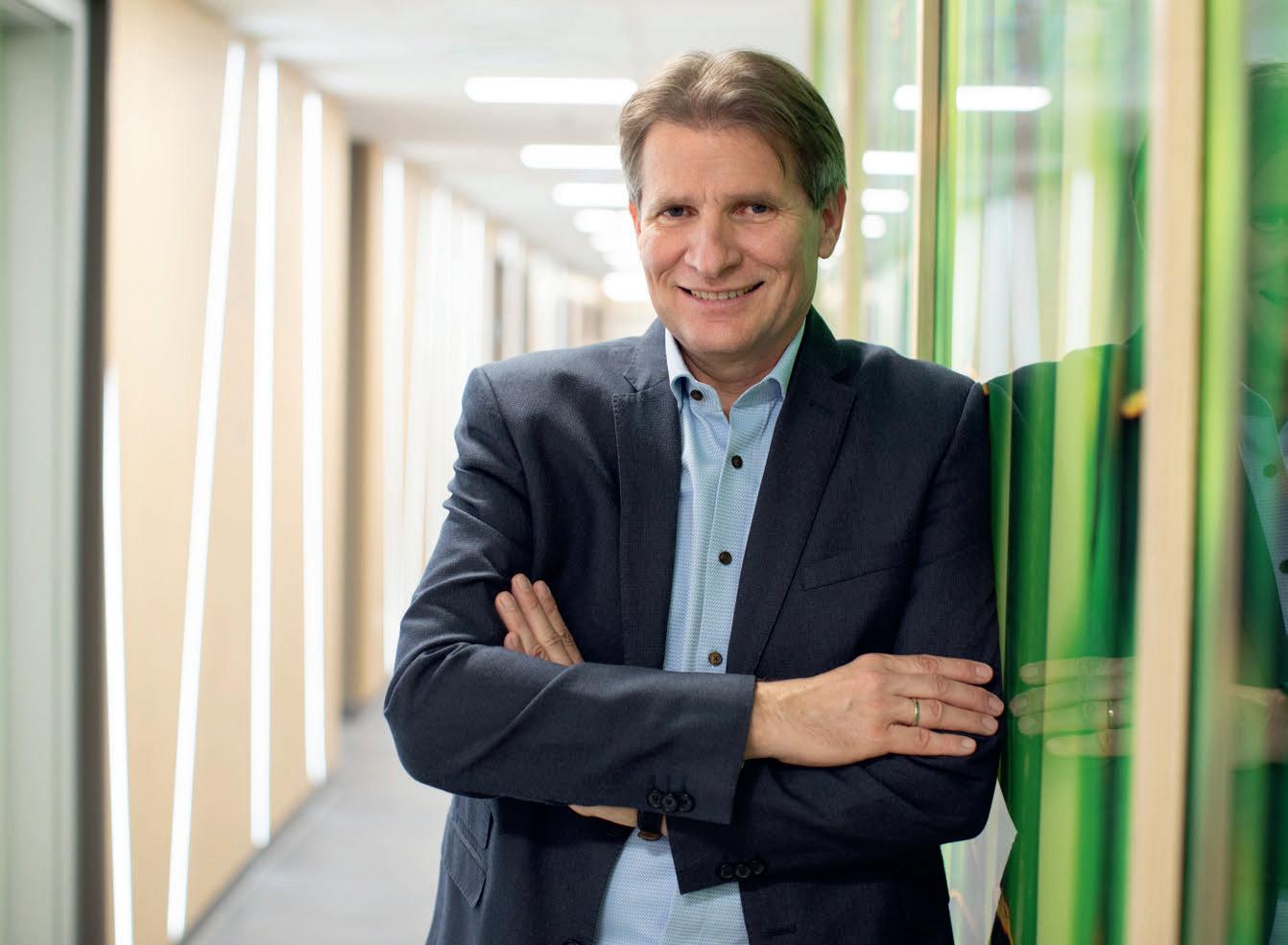
on new taxation rules, like the changes this January in the KATA taxation, which influences our relationship with our contracted doctors very negatively.”
A changing private sector
The private healthcare sector provides for about 50% of the outpatient care in Hungary. Approaching this issue from the patients’ point of view, the President points out that more than 60% of the patients have visited private healthcare providers in
12
APRIL 2021 |DIPLOMACY & TRADE| www.dteurope.com
private healthcare
the past two years. So, it is quite a widespread phenomenon, unlike 10-15 years ago when these kinds of services were the privilege of the rich – nowadays it is for ordinary people also. “In terms of money, we are talking about HUF 400-420 billion on an annual basis. It is a very fragmented sector: there are thousands of smaller or bigger providers and 60% of this turnover is generated by small ‘apartment clinics’ where there is only a single practice like gynecology or dermatology. In the past couple of years, there have been major developments with a lot of bigger providers emerging. These companies are now controlling roughly 25% of the total market. Over the next five years, we can expect a much more balanced private healthcare sector. There has also been a major change in terms of what services are provided. We all remember that 15-20 years ago, it was primarily gynecology, dentistry, dermatology and also some beauty care, including plastic surgery, provided by the private actors. The situation is not like that anymore. In the past ten years, basically all sorts of outpatient specialists like diagnostic imaging have appeared on the scene. Moreover, it is not only outpatient care but also inpatient services, like one day surgery or even more complicated types of even oncology or orthopedic surgery, are provided by the private sector, so, now it is more widespread and more integrated vertically,” he highlights.
More changes needed
Statistical data show that the Hungarian government is spending less and less of the country’s GDP on public healthcare. As to how much and in what areas private healthcare service providers can take advantage of this underfinancing, the PRIMUS President says that “yes, indeed, this state spending is one of the lowest proportions in the European Union, with below 5% of the GDP. Another 2-2.5% is spent privately, which is not so healthy from the point of view of accessing services. In the past years, especially since this January, there have been some changes in terms of salary increases for nurses and doctors – something that I think should be further increased. On the other hand, how Hungarians are spending their money on private healthcare is unhealthy as well because it is on an out-of-pocket basis and not on a sort of insurance basis where you pay a monthly fee and thus save for the time when you are really in need of services from a private healthcare provider.”
In need of private health insurance

As György Leitner notes, private health insurance in Hungary is in an embryonic stage. “All in all, the private Hungarian health insurance market is pretty small compared to the size of the country. Only corporate private insurance has achieved a certain level, so, it would be very much needed and required that a more mature individual private health insurance market emerges. There would be several criteria for that: first of all, there should be incentives by the state with tax holiday, for instance, for those who engage in private health insurance. There should also be developments from the supply side, although, it is a chicken or egg story: the medical service sector should also catch up, create a countrywide coverage and a nationwide product for private individuals. I hope that those in government will realize that this would be great supplement in terms of funding of the entire healthcare system in this country,” he explains.
The impact of the pandemic
“Many of the bigger actors in this sector play a part in providing healthcare for the public during the pandemic, including my company Affidea, a diagnostic imaging company, providing publicly financed services in several hospitals. We are basically operating under pandemic conditions in these institutions, so we take our share in this regard. The other element is how much burden we can take off the shoulders of the public health system during this unfortunate situation when patients are in need of care other than COVID-19. It is natural and understandable and the private sector offers its help and support to the state care system, sharing some of the burden by offering personnel and infrastructure,” György Leitner stresses.
Public-private partnership
Last November, it was raised at a healthcare conference in Budapest that there is an urgent need to rethink the role of private healthcare providers and the framework for their cooperation with the public health system. The PRIMUS President is of the view that there is certainly a willingness on the part of the government to have a clearer situation concerning a more transparent provision of public and private healthcare services. “However, there definitely are some areas where they mix. It happens when a doctor is taking his or her private patients into the public system and uses public infrastructure for the benefit of his or her own. That is not good. New regulations try to target and ban such activities. This is very positive. Another, more difficult area is when big private care companies are providing – and have provided for decades – services like diagnostic imaging, an accredited laboratory or dialysis, partnering with the state healthcare system on the basis of transparent regulations on prices set by the state. I do think that in these examples, this is a very positive and progressive partnership that we are hoping to maintain and even develop further.”
13 photo by DÁVID HARANGOZÓ
www.dteurope.com |DIPLOMACY & TRADE| APRIL 2021
private healthcare
Located in the heart of Budapest, in one of the most modern buildings in the city center with spacious interior, roof terrace and an elegant office environment, the Dr. Rose Private Hospital provides high standard services for its patients, standing out from among other private healthcare service providers in many areas since the beginning.
HEALING BODY AND SOUL
BUDAPEST’S OLDEST PRIVATE HOSPITAL CONSTANTLY DEVELOPS SERVICES AND PATIENTS’ CARE

The Dr. Rose Private Hospital in the Hungarian capital dates back to almost one and a half decades. As Managing Director Dr. Kornél Papik explains to Diplomacy&Trade, the hospital was founded in 2007 with the aim of providing a unique experience for well-to-do Hungarian and foreign patients living in Budapest, in addition to reliable, high-quality healthcare services. The choice of location, Széchenyi Square, with a panoramic view of the Chain Bridge and the River Danube, already served this purpose, but the exclusive interior design solutions, the spacious interior, the modern equipment, the service provided for the patients and the employment of renowned doctors together created the premium quality.
“Over the years, the standard has not changed, but we have expanded our services according to the needs of our patients. The institution, which initially provided outpatient care, opened its inpatient department more than ten years ago, where more than 10,000 medical interventions have now been performed. In the three operating rooms and the 28-bed inpatient ward, patients undergo plastic surgery, orthopedics, obstetrics-gynecology and surgery interventions. We are proud of our obstetrics department, where all the conditions are in place for a safe, peaceful birth and for spending the first days together in our family apartments. The more complicated interventions are no problem, either, the excellent specialists working here perform surgeries from orthopedic endoprosthetic surgeries to breast reconstruction or colon surgery thanks to the 7/24 hour on-call system and the high-level equipment.”
He emphasizes that the demand for inpatient and hospital surgical care is constantly growing


in all fields, especially in orthopedics, general and plastic surgery, obstetrics and gynecology.
“In 2020, the Dr. Rose Private Hospital performed nearly 2,000 major surgeries, which is outstanding in private healthcare,” he adds.
For all ages
The institution has a strong pediatric department but that is not the only reason Dr. Rose is called the family hospital. Obstetrics and gynecology are traditionally important divisions here but they can also provide 14 specialized pediatric care, and for patients in adult medical care, they have a team of specialists in all fields supported by highquality equipment. There is actually a family in which all members have been cared for at Dr. Rose for ten years, so, generations are healing with this institution from babies to grandparents, the Managing Director says, adding that they have an annual fee for such constructions. “Dr. Rose created a market 14 years ago, and now, there are several private hospitals here. We have strong competitors, which also inspires us to continuously improve.” In addition to the best professional conditions, the unique experience, the environment and the attention ensure that the soul also heals, providing the feeling that every detail is taken care of at Dr. Rose. Personality and professionalism are important so that all patients feel a priority. This is complemented by unique customer service, an experience-friendly, premium environment and transparency.
COVID-19 safety
As to how much, and in what way, the current epidemic has affected daily patient care at the Dr. Rose Private Hospital, Dr. Papik points out that “the COVID-19 epidemic is a constant challenge for all healthcare providers,
including us. Epidemic care, such as testing, and routine patient care are very difficult to perform safely in parallel. Enhanced safety standards are mandatory throughout the hospital. To isolate those arriving for testing, we established a COVID-19 screening center completely detached from the hospital, where all known testing methods are available, from officially priced PCR testing to rapid antigen testing and antibody level determination. We work with laboratories that have the necessary accreditation and produce the fastest results. Our quick tests come from American and European manufacturers. Negative test results are sent to our patients on weekends immediately upon receipt, and positive results are reported by a doctor in each case so that further action can be discussed and taken. In our hospital, screening is mandatory before all surgeries and other interventions, even examinations with increased exhalation. Our patients are continuously tested and almost all of our staff have now been vaccinated. With these measures, we managed to achieve that although we find many positive cases during the screenings, no infected patient was admitted to the hospital.” Another impact of the new coronavirus epidemic was that it steered patients towards
the private health sector. Unsurprisingly, private service providers responded quickly to new customer needs, offered new services, and began improvements. Dr. Papik says that after the first wave of COVID-19, there was a clear increase in the number of patients and the growth has continued ever since as it has become very important for patients to have quick access to safety and full service. He adds that they responded to the needs by increasing their supply capacity, further expanding the range of professions available and developing new products, including the investigation and treatment of post-COVID patients in both adult and pediatric patients.
Investments for better care
Many private healthcare providers are looking to the future positively and are making further investments in the post-epidemic period to provide high-quality, comfortable and quickly accessible care to be able to retain their clients and attract more in this multi-player market. As the Managing Director stresses, the Dr. Rose Private Hospital is now available to a wider audience and their prices are in line with those of leading private care providers. They are constantly adapting to emerging needs and place great emphasis on development.
“We believe that if our customers are satisfied, we should not be afraid of competitors,” he says, adding that in 2021, an investment worth more than HUF 600 million have been made, the institution having been expanded with additional wards and operating rooms, the obstetrics department have been rebuilt and the client rooms have also been increased. The hospital is constantly adapting to emerging needs and place great emphasis on development. "Medical device investments affect almost all professions. For patient safety and increased sterility, we have purchased a new plasma sterilizer and a UVC disinfector, which is also effective against the new coronavirus. In addition to operating rooms, the rooms are disinfected before receiving each patient. The radiology department has been expanded with new digital X-ray equipment and the latest state-of-the-art mammography available today. We place great emphasis on obstetric and neonatological care: our new ultrasound equipment supports diagnostics, while the integrated neonatological equipment supports the care of newborns,” he highlights, adding that their philosophy is based on premium care: services are provided in a way that adapts to the needs of the patient, without waiting, in a discreet manner – that will continue to receive special attention this year at Dr. Rose Private Hospital.
APRIL 2021 |DIPLOMACY & TRADE| www.dteurope.com
14 photo by DR. ROSE PRIVATE HOSPITAL
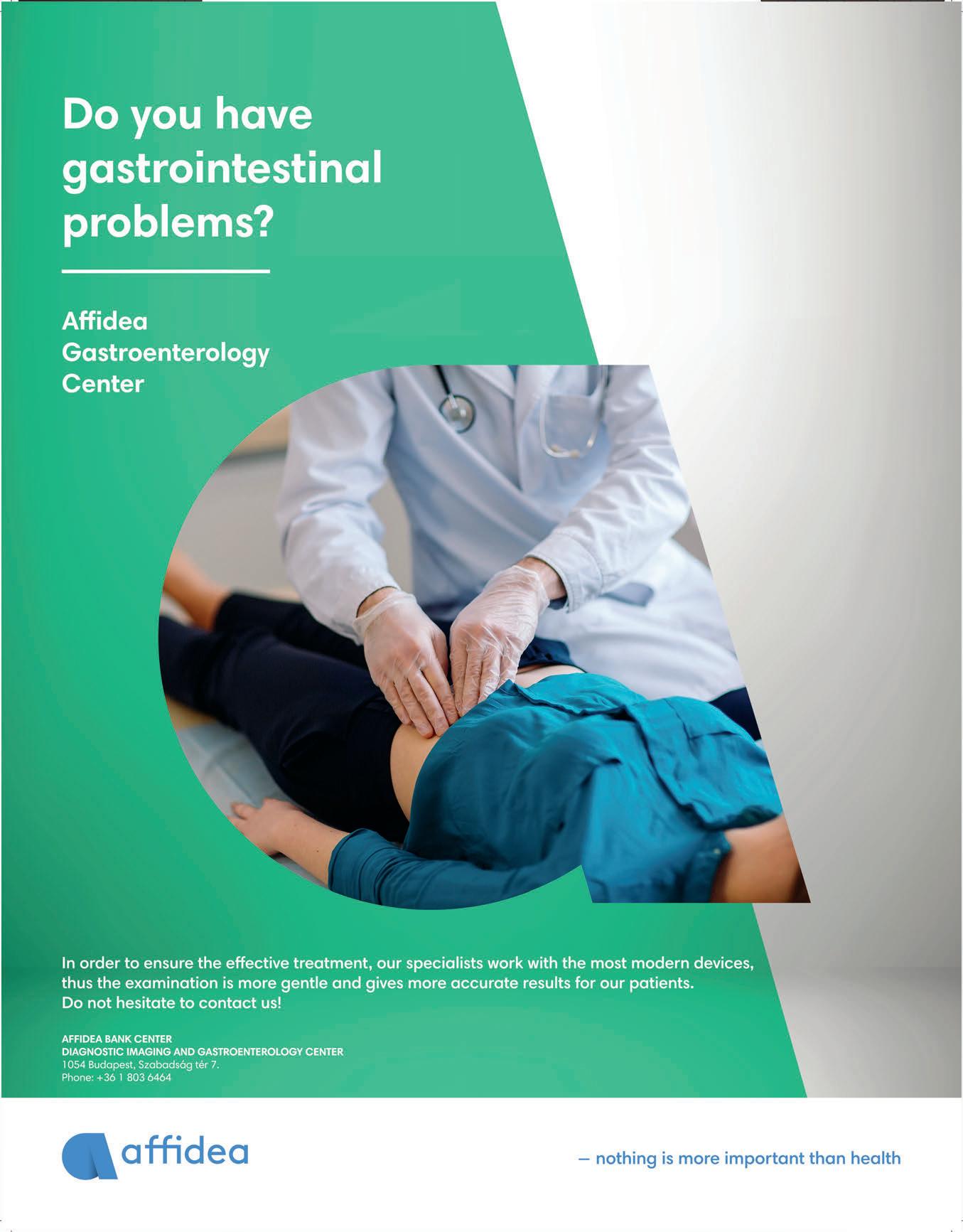
private healthcare
twenty years has greatly improved the level of professional experience of physicians. “There are more and more doctors who had the opportunity to take part in post-gradual trainings and work abroad. In addition, in today’s online world, trainings have become so simple. Language proficiency is another important factor as those who have spent years abroad working or graduated in a foreign country will express themselves in a given language with much more confidence.” Citing his own example, Dr. Schwab says it basically does not matter for him if needs to speak to a patient in English, German or Hungarian. He himself had part of his medical training at the Universities of Vienna, London and later had work experience in Basel, Switzerland and received his MBA degree at a joint program of CEU and Purdue University in the United States.
Appeasing the nervousness about testing
A REFERENCE HUB IN GASTROENTEROLOGY
The Affidea Gastroenterology Center in downtown Budapest awaits patients with the continent’s most modern diagnostic equipment, the excellence of the national gastroenterology profession – trained experts with many years of experience – and a pleasant environment.


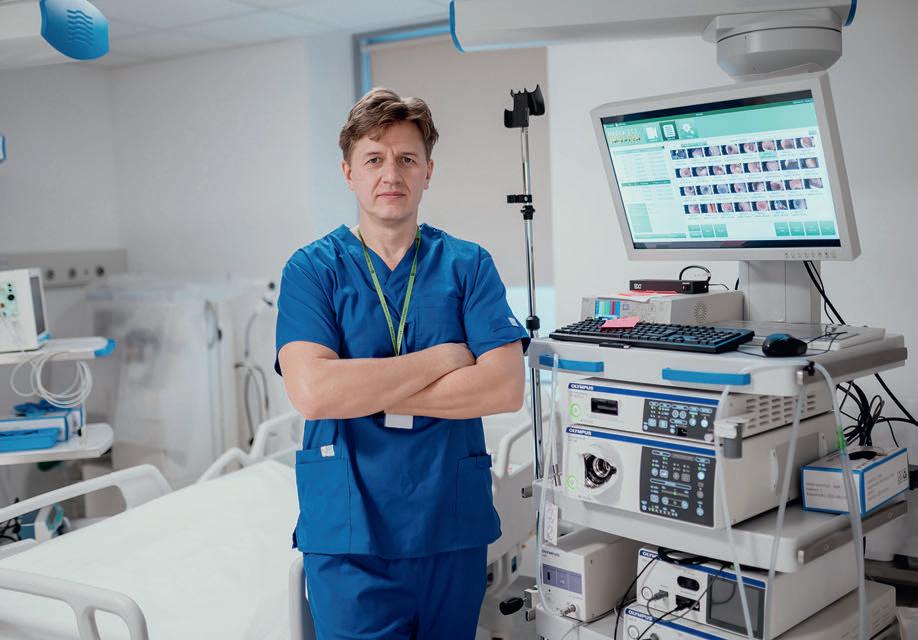
The number of newly discovered cancers dropped significantly in 2020 since the start of the pandemic, presumably due to the late and delayed conduct of various cancer screenings and other routine health examinations. One of those highly-trained professionals at Affidea Gastroenterology Center, Dr. Richárd Schwab tells Diplomacy&Trade that “we cannot really talk about capacity decrease. For quite a long time – it was a ministerial decree in Hungary (as in many other countries) that only emergency medical procedures were allowed. It means that preemptive screening examinations for patients without complaints were not allowed. To put it simply: this has been the case over the past 12-13 months. Postponing tests due to the pandemic, a worldwide tendency, is likely to increase cancer cases both in the number of patients and in the severity and frequency of the cases, unfortunately. The healthcare system was forced to postpone examinations but this also coincided with the perceptions of the population as nobody wanted to get into a hospital or even have a test if it was not something urgent. As a result, we encounter more and more neglected cases, patients who apply for tests because of long-standing health complaints.”
A reference hub of HD quality
The Affidea Gastroenterology Center awaits patients with Europe’s most modern GI endoscopy equipment. As Dr. Schwab explains, it is the Central European reference hub for the world renowned and most prestigious GI endoscopic equipment manufacturer, Olympus. “All in all, I can say that all the pieces of equipment at the Affidea Gastroenterology Center is of the latest technology available not only concerning endoscopy but also patient logistics, the service environment, making available a high level of treatment and service. For instance, it is unique in Hungary that all tests are recorded in HD quality and all patients receive the entire video material. It is important for later direct comparisons, 2nd opinions, referrals. HD recording is also important from the quality control perspective. So, it was a constructive step from Affidea partner EndoExpert Ltd., a Group Practice of Gastroenterologists, who brought all this expertise, international experience and combined with the solid capital strengths and market access of Affidea.”
He adds that although the pandemic also puts limitations on this activity but the cooperation with Olympus is intended to extend to a preceptorship program for training
gastroenterologists on how a properly equipped private healthcare service center should look like and organized as a business. Everything is according to strict standards starting from the arrival experience to the quality of beds and patient comfort to the highest level of patient safety during the exams. This center is the first in the country to use ‘Scope Guide’ in the routine setting, a 3D-Image-Navigation System providing real-time 3D image of the position and configuration of the endoscope inside the colon. Navigation through the colon becomes easier and patients experience less discomfort as loops can be identified more quickly.
Experienced professional staff
Doctors working at the Center have extensive international experience, which adds to the quality of work and to the comfort of the patient.
According to Dr. Schwab, the fact that Europe has become such an open space in the past
By nature, many of the gastroenterology examinations are (or are believed to be) uncomfortable and/or painful. As to what is done, what new technologies are used to appease the nervousness of the patients, the doctor highlights that these beliefs may come from experience in the past. It is now for at least ten years that examinations in anesthesia have become widespread practice. “We also do some 90% of the diagnostic tests in propofol anesthesia, same standards as anywhere of the highest ranking centers of excellence globally.”
Do not miss your check-up!
Many future illnesses are not symptomatic in the early years, and the question also arises that despite the difficult situation due to the pandemic, what tests are the ones that should definitely be carried out. When someone had cancer of the GI tract in the past, regular follow-up exams cannot and should not be postponed. Same applies for advanced benign tumors that need thorough and regular check-ups, or for inflammatory bowel diseases (IBD), Dr Schwab says, giving a list of the most important examples. “We have recently had a patient who has had minimal invasive surgical procedures multiple times in the past ten years due to recurrent advanced rectal polyps. She was supposed to show up for the next control examination last December but she postponed it due to the pandemic. I managed to convince her to come and it really paid off: we have indeed found new polyps of advanced stage. It is very important that check-ups in such cases should not be put off – it is not worth the risk!”
APRIL 2021 |DIPLOMACY & TRADE| www.dteurope.com
16 photo by ÁDÁM BÉRES, DÁVID HARANGOZÓ
AWARDED AT HUNGARIAN INNOVATION GRAND PRIX
In 2020, Tungsram won the IT Innovation Award of the Hungarian Innovation Grand Prix competition for “recycling” the company’s traditional capabilities in innovative areas (tungsten fiber development, sustainable and safe food production).
The jury of the Hungarian Innovation Grand Prix selected the 2020 Innovation Grand Prix winner from 69 Hungarian companies; it also awarded seven other innovation prizes and the Startup Innovation Prize of the year. One of the main criteria included the economic results of 2020 achieved by innovation. The winners were selected through a secret ballot.
Pharmaceutical producer Richter Gedeon received the 2020 Hungarian Innovation Grand Prix for the creation of Terrosa, a new biosimilar Hungarian drug. The entry of Terrosa, developed for the treatment of osteoporosis, proves the success of the biosimilar concept, with sales of EUR 27.2 million in its first full year. The drug also marks the realization of the “invented and made in Hungary” economic development concept.
The 29th Hungarian Innovation Grand Prix was organized with the support of the National Research, Development and Innovation Office (NRDIO), financed from the NRDI Fund. President of NRDIO and co-president of the jury, Dr. Zoltán Birkner stressed that “during the pandemic R&D and the momentum of
innovation is more crucial than ever as they can be the key motors of kick-starting the economy and sustainable development. The Innovation Grand Prix does not only annually mobilize the actors of the ecosystem by acknowledging the most prominent national achievements in the field, but it also has a great impact on the social acceptance of innovation.”
According to the titles published in today’s press, the globally competitive solutions won and we believe that our internationally acclaimed Agritech ecosystem is one of them: the highest quality products, engineering expertise and flexible project approach of Tungsram can make indoor and vertical farming a solution that strengthens food security and eliminates hunger in the world. With the new innovation project launched in 2019, Tungsram entered the yet forming industry of indoor vertical farming. The aim of the project is to first create a vertical farming technology and then the prototype of a modular structure vertical farming system that can make the technology accessible to others. As the result of the technical development innovation in 2020,


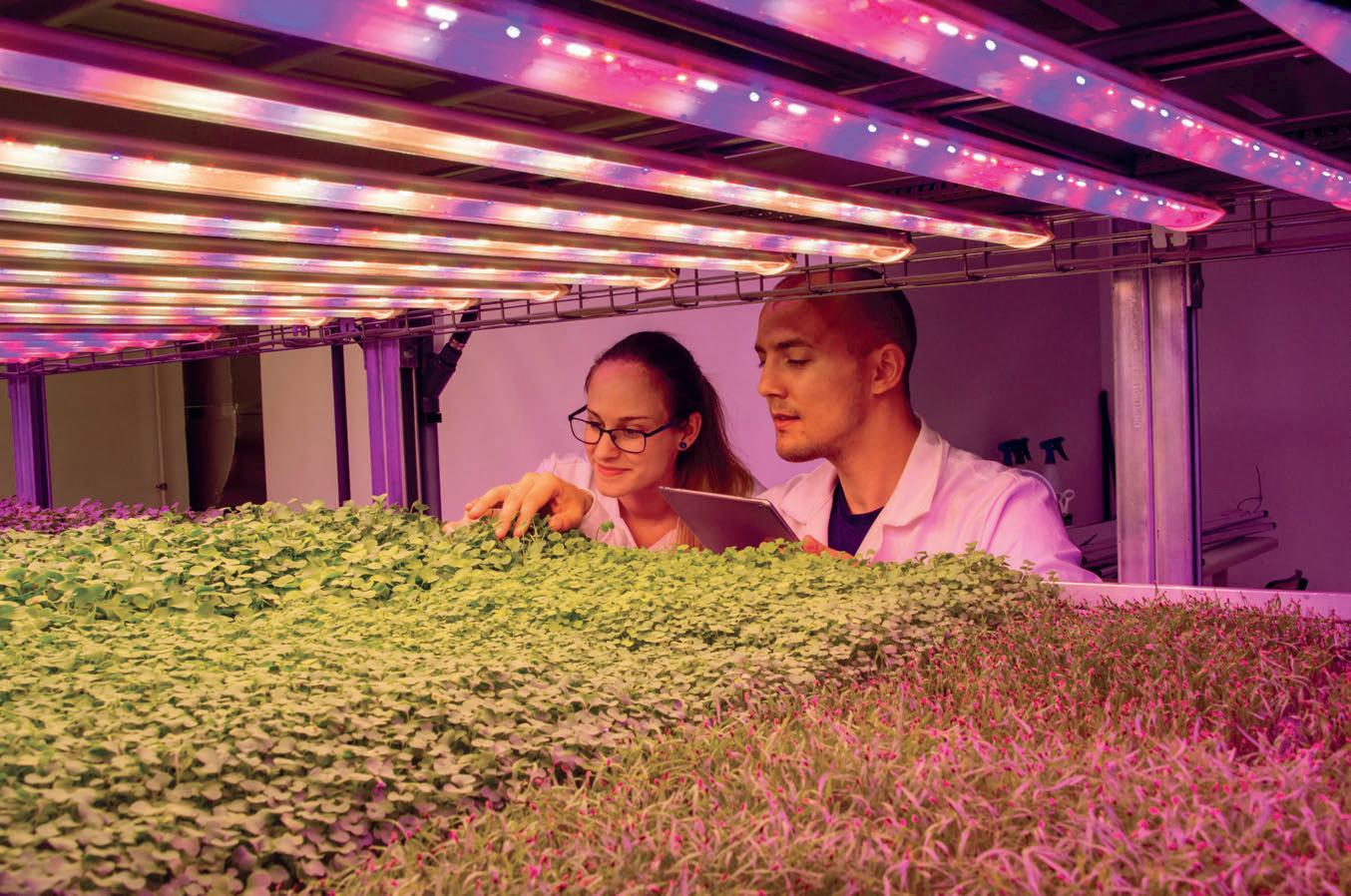
various product groups used in the Agritech business, the so-called Growth Cabinet and the related controlling software were developed. The other section of the application included the development of tungsten wire: as a result of two-year-long development, we have successfully worked out the material and manufacturing technology of a tungsten wire that complies with the strictest medical technological regulations. The development of the tungsten wire necessary for the
operation of robotic arms and suitable for surgeries was completed by our experts in Hajdúböszörmény, E Hungary. The validation based on our customer’s tests carried out by the U.S. Food and Drug Administration proves the quality of the work, thus the mass production could begin. We congratulate the winners and thanks to the Ministry for Innovation and Technology and the Hungarian Association for Innovation!
www.dteurope.com |DIPLOMACY & TRADE| APRIL 2021 17 photo by TUNGSRAM
innovation
Following last year's regional consultation, the General Assembly of the Business Council for Sustainable Development in Hungary (BCSDH) recently held its annual meeting and hosted as guest speaker the President-CEO of the World Business Council for Sustainable Development (WBCSD) Peter Bakker who gave a presentation on 'Making stakeholder capitalism real and rewarding' to nearly a hundred CEOs.
“Capitalism, and its consequences for society and the environment, are very much in the spotlight. Even committed capitalists are beginning to argue that capitalism, in its current form, is unsustainable –socially, environmentally, and economically. Yet capitalism’s core features of private enterprise and competitive markets are essential to addressing our greatest societal challenges and unleashing the transformations required to meet the Sustainable Development Goals (SDGs),” Peter Bakker tells Diplomacy&Trade. He is of the view that stakeholder capitalism is not yet real for business. “We have no shared definition, the expectations of business are not clear, there is no roadmap on how to implement it, and much of the financial system architecture is still focused on (short-term) financial returns. That being said, there are definitely signs of progress in the stakeholder capitalism debate and at WBCSD, we’re taking a leading role in making the building forward for a better capitalism real and rewarding for business.”
For a capitalism of true value
As to what solutions he offered in his lecture to make stakeholder capitalism ‘real and rewarding’, the President-CEO points out that “in our ‘Vision 2050: Time to Transform’ report, we focus on the need for leaders everywhere to change their mindsets towards building long-term resilience, towards a regenerative approach to business and ultimately towards reinventing capitalism. Transforming our global systems will take more than just engineers improving the products and services that business produces; business is good at that but will need to go further this time.”
The most critical of these mindset shifts, he says is the one about the reinvention of capitalism. “This shift will ensure that the economic system, our incentives, the global accounting standards and the capital market valuations will no longer just be based on the financial performance of business but integrates the impact on the planet and people as part of how we define success and determine the enterprise value. The move to a capitalism of true value for all will accelerate the transformation towards 9+ billion people all living well, within planetary boundaries, faster than anything else.”
Interests and trust
In stakeholder capitalism corporate entities are oriented to serve the interests of all their stakeholders and oftentimes, the interests
FOR BUILDING A REAL AND REWARDING CAPITALISM
LONG-TERM VISION: 9+ BILLION PEOPLE LIVING WELL, WITHIN PLANETARY BOUNDARIES, BY MID-CENTURYW
need is one that rewards true value creation – not value extraction as today’s model does. Specifically, this means that all social and environmental costs and benefits should be internalized and reflected in the relative price of goods and services, and in companies’ profit & loss statements, costs of capital and market valuations.
WBCSD has long been committed to making more sustainable companies more successful.
A reinvented capitalism focused on true value would lead to a world in which more companies innovate in ways that contribute to a flourishing society, capital markets properly value and reward inclusive, sustainable business practices and, as a result, more capital is mobilized to deliver the SDGs and the goal to limit global temperature rise to 1.5°C since pre-industrial levels.
Impact of the pandemic
Peter Bakker stresses that the COVID-19 pandemic has made the reinvention of capitalism even more important: it is now a critical part of the way in which we respond to, and recover from, the global pandemic. Not just in order to ensure that sustainable development is prioritized in recovery strategies, but because the pandemic has shone a cold and harsh light on many of the negative outcomes generated by our current model. Companies cannot ignore the vulnerabilities that have been revealed.
“The debate about the future of capitalism is playing out in public, and COVID-19 has only increased interest in the conduct and convictions of companies. We believe that now is the time for companies and investors to enter – and lead – the debate not just about whether capitalism needs to change, but about how we go about reinventing it,” he says.
It is time for transformation.
“Our world is facing three pressing global challenges: the climate emergency, the loss of nature and growing inequality. Each of them, on its own, can endanger the safe operating space for humanity and the planet, as well as the license to operate for business. And if there is one thing that we have all learned from the COVID pandemic, it is how interconnected these challenges are,” the WBCSD President-CEO points out.
of the different stakeholders contradict each other. Peter Bakker is of the view that “reinventing capitalism will be very challenging and will require complementary action from many different actors and stakeholders across all sectors and continents, including Hungary. It will require leaders from business, government, and finance to embrace a broader – and longer – definition of selfinterest than is the norm today, recognizing that a livable planet, an equitable society, and genuinely free and fair markets are in their individual and collective self-interest. And, critically, it will require a huge amount of trust: only if businesses and governments trust one another will they have the confidence to take the steps needed to reinvent capitalism.”
All costs should be reflected in the price
As WBCSD President, he says stakeholder capitalism can help businesses achieve the sustainability goals they set for themselves.
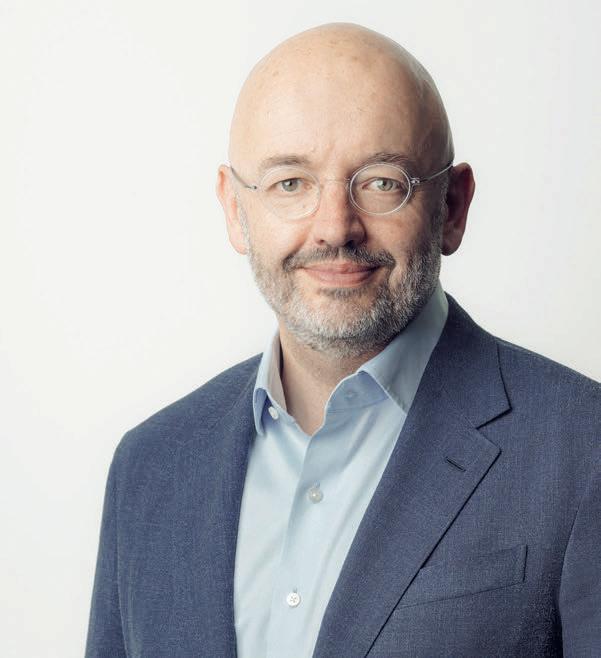
“Capitalism’s core features of private enterprise and competitive markets are indispensable if we are to achieve the scale and speed of transformation needed to achieve our Vision of a world in which 9+ billion people can live well within planetary boundaries. But our success or failure in achieving our Vision 2050 is likely to hinge to a significant degree on whether capitalism can be reinvented for the better, and for its own good, during the next ten years.
The reality is that this is not simply a social and environmental agenda – it is about creating the conditions for long-term business success.”
WBCSD makes the case that the capitalism we
“We need a long-term vision that we can all rally behind: 9+ billion people living well, within planetary boundaries, by mid-century. Achieving this relatively simply worded vision requires a wholesale transformation of everything we have grown up with: energy needs to decarbonize; materials need to go circular; food needs to be produced sustainably and equitably and provide healthy diets.”
The need to transform systems is rightfully the concept that everyone in sustainability is talking about; now, it needs to be backed up by actions.
It is now or never. WBCSD’s ‘Vision 2050: Time to Transform’ report focuses on nine transformation pathways – actionable routes for companies to take – covering the areas of business activity that are essential to society: energy; transportation and mobility; living spaces; products and materials; financial products and services; connectivity; health and wellbeing; water and sanitation; and food. “It should inspire you to put more focus and more ambition in the journey of your company and help you shape the agenda for your company’s transformation,” Peter Bakker concludes.
APRIL 2021 |DIPLOMACY & TRADE| www.dteurope.com sustainability 18 photo by WBCSD
ITALIAN CHAMBER PRESIDENT PASSES AWAY


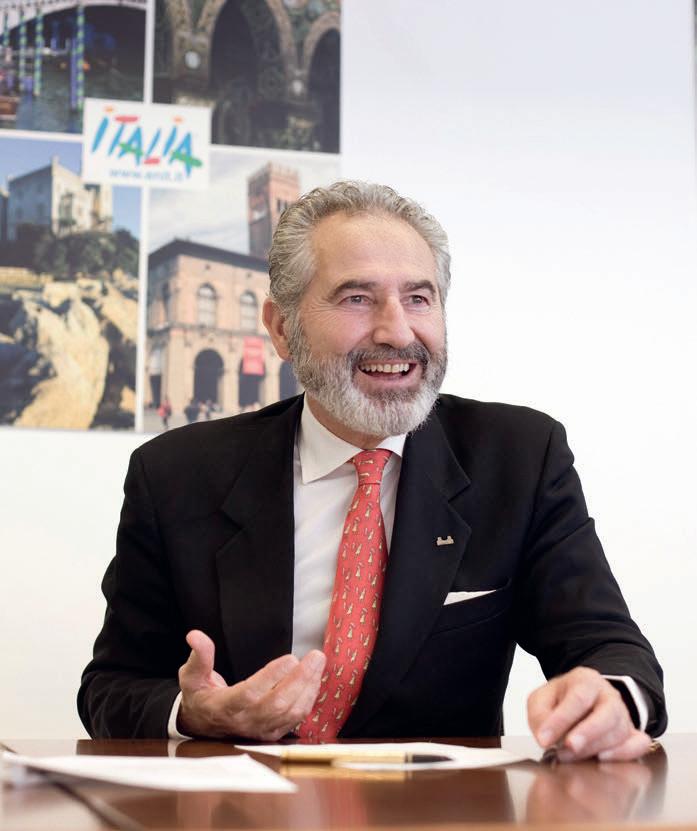
ITALIAN COMMUNITY IN HUNGARY MOURNS A CHEERFUL AND HELPFUL PERSON


It was shocking to read an announcement on the afternoon of March 23 by the Italian Chamber of Commerce for Hungary (CCIU) that the President of the organization, Francesco Maria Mari passed away in Rome.


Having arrived in Hungary more than 15 years ago as a simple tourist, Francesco Maria Mari fell in love with Budapest and of what he termed as ‘the extraordinary quality of life that the city offers’. Then, he recognized the great opportunities offered by this country and established himself as an entrepreneur. He was deeply involved with the Italian community here. He was Vice-President of the Italian Chamber of Commerce in Hungary for two years followed by an appointment of the Board of Directors as CCIU’s General Secretary before becoming President of the organization.
Born in 1955, Francesco Maria Mari graduated in Law and held a Master’s degree in Business Administration from Bocconi University. He had more than 20 years of experience in management, during which time he held important positions at major Italian and international firms. Furthermore, he had a 15-year experience in business activities where he specialized in corporate start-ups in the sectors of services, web and telecommunications. As we, at Diplomacy&Trade, learned when we met him for interviews, he possessed a deep knowledge of the Hungarian macroeconomic environment. We recall how enthusiastically he spoke about the importance of communication in his work at the CCIU, spreading information at Italian business days and business breakfasts, while his colleagues spoke about his practical and resultoriented managerial style. He was what English people would term as “jolly good fellow,” a cheerful and helpful person enjoying life and being kind to others.
Let us – the staff here at Diplomacy&Trade – also join the many who expressed heartfelt condolences to his family and friends.
Rest in peace, Francesco!
chamber www.dteurope.com |DIPLOMACY & TRADE| APRIL 2021 19 photo by DÁVID HARANGOZÓ
witty leaks
WITTY LEAKS
IN THIS SERIES, DIPLOMATS SHARE PERSONAL ACCOUNTS
FROMBANGKOK TOBUDAPEST


BEHIND THE LENS –

BY A
“Life is like a camera, just focus on what is important and capture the good times.” This expression sounds so true to me as I am passionate about photography. While the coronavirus pandemic poses certain limitations, I take the opportunity to explore Hungary and spend my leisure time domestically and photographically. Before I took up my posting here in Budapest, I had seen a number of articles and TV programs about this country. Hungary is well-known among the Thai people as a country of great beauty, long history and warm people. But yet, I was pleasantly surprised to see that, despite the distance between Thailand and Hungary, the two countries share some elements of similarity.
The Rivers of Life
While the Danube River runs through the heart of Budapest, dividing the city into two parts with plentiful and historical sights, the Chao Phraya River has always been the bloodline of Bangkok and a life-giver to various provinces of Thailand through which it flows. Flowing from the north of Thailand, through Bangkok, southwards to the Gulf of Thailand, the waters of the Chao Phraya River have shaped the history of the modern Thai capital. By time, the river banks landscape and way of life has expanded extensively. The river nowadays serves as transportation network and urban settlements with soaring hotels and condominiums hem
in solemn temples, churches and civic buildings along both sides of the river. When we have abundance of water, it is important to know how to make good use of it. I am pleased with the increased cooperation between our two countries on water resources management. Despite the physical contact barriers during the pandemic, our countries have successfully convened, through a video conference, the first meeting of the Joint Steering Committee on Cooperation in Water Resources Management in October last year which allows us to set up a three-year cooperation plan in such areas as water development, groundwater management and wastewater treatment. I am sure that the cooperation will further expand for the benefits of our two countries.
The local warmth
While Budapest is a truly beautiful city to look at, the people here are just as friendly and helpful. In my experience, Hungarians are polite, approachable and relatively open to foreigners. Many times, when I go out to take pictures, I often meet people with friendly face who give me a return smile or even a hand if needed. Such small gestures may be a no-bigdeal in daily routine life, but it shows how much you care for others. The world is getting busier and digitalized, caring and support to other
people have become increasingly important. Thailanders have a similar manner from this point of view. We are often referred to as ‘The Land of Smiles’. The Thai people always offer their smiles and are just as friendly in the big cities as they are in countryside towns. It is also ingrained in our culture to be respectful of others and lend a hand when the occasion arises. The connections between our peoples can be seen easily. Thailand is a popular destination for Hungarian tourists, while Hungary is home for almost 2,000 Thais as well as a can’t-miss destination in the Europe’s itinerary of the Thai tourists.
Loving the elders
I appreciate the way that Hungarians hold their family value and respect the elders. I noticed after visiting some families that, unlike many western countries where elder person typically lives alone or with an elderly couple, senior people here are in good care of their offspring and many of them live under the same roof. Maybe it is from my own culture, but I used to feel emotionally touched when seeing the young taking care of the old in the family. In Thailand, family is considered to be the foundation of life. The meaning of family can even extend, from the domestic unit, to close neighbors and friends. We commonly use the
word ‘phi’ and ‘nong’, or brother and sister, before someone’s name to indicate affection that they are like siblings. The Thai families are in close connections with several generations living together. It is even common for some newlyweds to live with their families until they have their own children. Grandparents, aunts, or older siblings sometimes help raise the children. And, of course, there is a high level of respect bestowed upon the elderly. In my view, our two countries also share some similarities on this aspect.
Eat and play
Thailand and Hungary are gastronomically famous on their spiciness. Thai food has a reputation for being spicy. We even have a saying “mai phet, mai aroy” or “if it isn’t spicy, it isn’t tasty!”. In fact, the essence of Thai food is all about balance. A balance of different flavors: sweet, sour, salty and spicy. Hungary, on the other hand, has specialties and traditional foods that are considerably spicy with the use of paprika and other spices. Both nations represent their gourmet charms in distinctive and uncompetitive ways. I am happy to see the presence of Thai cuisine in Hungary, with a number of eateries featuring authentic Thai flavors, while many more include trendy Thai dishes in their menu. The Royal Thai Embassy has granted the ‘Thai Select’ award to those Thai restaurants as a guarantee for authentic Thai tastes. Food lovers eager to try to find Thai cuisine should simply look for restaurants with this logo. Another aspect that I see is that the Hungarians are sport-lovers. I had a chance to witness the Budapest Marathon in October last year where I was fascinated to see so many runners racing enthusiastically along the beautiful scenery of the Danube River. No wonder why Muay Thai, or Thai boxing, among other sports, has gained much popularity here. There is an increasing number of Muay Thai Clubs in Hungary. I have visited some events and noticed that the Hungarian boxers have taken this sport seriously. Muay Thai has won global popularity and become one of the fastest growing combat sports in the world. It is now included among the sports to feature at the 2023 European Games in Krakow, Poland. I am sure that there will be more talented Hungarian boxers showing up in time.
Diversity in pictures
I take this opportunity to show some photos that I took recently. I am not a professional photographer and simply take the shutter with passion and curiosity, to capture memories, daily lives and culture in places I have been. Each place has its unique and incomparable character, but it helps me shape the good memories of my own culture. The trends of cultural convergence between countries are increasing with globalization. But what I learn is that diversity makes us stronger and new culture makes life more colorful.
APRIL 2021 |DIPLOMACY & TRADE| www.dteurope.com
20
OF THEIR EXPERIENCES ON “EXCURSIONS” into Hungarian culture, art, gastronomy & scenery.
photo by THE EMBASSY OF THAILAND, BHAKAVAT TANSKUL
AN ANALOGY
AS SEEN
PASSIONATE PHOTOGRAPHER BY THE AMBASSADOR OF THE KINGDOM OF THAILAND, BHAKAVAT TANSKUL
FUTURISTIC
APRIL
FUGA

BUDAPEST CENTER OF ARCHITECTURE / ONLINE
The FUTURISTIC textile collection by textile designer Szilvia Szigeti is inspired by the work of the Austrian Wiener Werkstätte, a workshop that dominated the first decades of the 20th century, including Koloman Moser and Josef Hoffmann, as well as the works of Kandinsky and the spectacular decorative qualities of Pedro Almodóvar's films of the 1990s. The designer has also been influenced by the work of Spanish artist-designer Jaime Hayon whose furniture and objects emphasize the interpenetrability of different genres, balancing on the fine line between art, decoration and design. The work Musica ricercata by the composer György Ligeti, which the designer's daughter (pianist Róza Radnóti) was practicing during the design phase, also played a significant role in the creation of the collection. "I believe that dialogue between different artistic disciplines is important, which is why it was a great pleasure for me that our previous exhibition TEXHIBITION could also serve as a backdrop for the concerts of the Transparent Sound New Music Festival at the FUGA. It was a special feeling to see how the textiles added to the experience for both the audience and the musicians. This productive encounter gave the idea for further collaboration. The objectified rhythms, repetitive motifs, smaller and larger formal units in the FUTURISTIC collection inspired the decision to collaborate with the Transparent Sound New Music Festival in the future. As a first step in thinking together, I asked Balázs Horváth, composer and one of the founders of the Festival, to formulate common points with my textiles that could be inspiring from a musical point of view." (Szilvia Szigeti) fuga.org.hu
OFF-BIENNÁLE BUDAPEST
FOR FIVE WEEKS FROM APRIL 23

ONLINE AND ON-SITE
The OFF-Biennale Budapest, a series of independent contemporary art events with more than 30 exhibitions and events and almost 180 participants, kicks off on April 23. In response to the special situation, OFF takes a hybrid form: during its five weeks, visitors will be able to enjoy guided tours, talks and presentations, partly online, but also live, in line with the rules of the epidemic. The OFF opens with an online event. The Biennale's community space, the Nappali (‘Living Room), is located in Lónyay Street. During the opening, the Nappali is transformed into a studio with a live broadcast on Partizán TV on YouTube from 7pm. Members of the OFF team will be on hand to answer questions and give short video presentations of the projects.
One interesting program is the artistic project ‘A Bouquet of News Songs’, in collaboration with the Women's Choir from Kartal: choir members will present their artistic work in a video and a video clip. In collaboration with the artistic team, they rewrote folk songs to tell the story of women's fates, the rural life of today and the life in the modern day, their own daily lives – as the national media does not do so.


The organizers of the Varsányi Szirének (‘Varsány Sirens’) choir are preparing an online event on May 1 to celebrate the day with a reading night, to celebrate the invisible work of women in particular! And at the end of May, they will present an outdoor public performance. offbiennale.hu

11TH FRANCOPHONE FILM DAYS



APRIL 22 – MAY 02, ONLINE

The returning event of the spring brings the best of Frenchlanguage cinema to Hungarian audiences, who this year, of course, will not be in the cinema but in front of their screens. For the first time in Hungary, films from the major film festivals (Cannes, Venice, Oscar) will be screened, but this year's must-see will also include films for the general public, comedies, dramas and children's films. The online edition of the 11th Francophone Film Days, organized in cooperation with the Francophone embassies in Hungary, is also full of names that will make any cinema-goer's head spin. New films by Catherine Deneuve, Gérard Depardieu and Catherine Frot will also be joined on the screens by young talents. The Film Days selection, available from April 22 to May 2, includes eight feature films with Hungarian subtitles, as well as accompanying programs organized in collaboration with the Uránia National Film Theater. franciaintezet.hu
TOM JONES - A CELEBRATION
AUGUST 19, VESZPRÉM ARENA
On July 18, the legendary Sir Tom Jones will take to Veszprém Arena’s stage to repeat his hugely successful concert of 2017. One of that night’s special surprises was when Tom Jones invited Mátyás Probijszki, his warm-up act, to perform with him at the end of his concert.


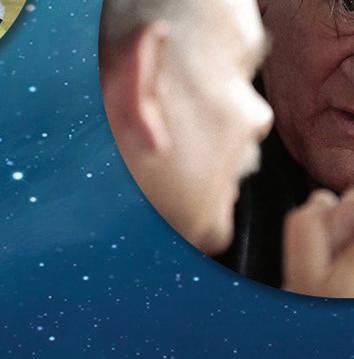
Tom Jones is one of the few musical acts who began singing at the dawn of modern pop music and continues his musical career uninterrupted to this day with important records and performances. His fascinating interpretation spans musical eras and genres, and is intended for fans from young to old, men and women, mainstream and niche music lovers.

The 80-year-old musician has released 41 studio albums throughout his eventful career, of which more than 150 million copies were sold worldwide. His latest studio album entitled ‘Long Lost Suitcase’ was released in 2015. He has had 36 songs in the UK and 19 songs in the US Top 40 chart.




In 1966, Jones was awarded a Grammy for Best New Artist, he received an MTV Video Music award in 1989, as well as two Brit Awards. In 2006, he was knighted by Queen Elizabeth II for his services to music. From 2012, with the exception of one series, he has been one of the main coaches on ‘The Voice UK’. veszpremfest.hu

IDA NIELSEN & BAND

PERFORMANCE
APRIL 30, STREAM
Over the past seasons, the Palace of Arts (Müpa) in Budapest has recorded hundreds of concerts and performances, more than 100 of which can be viewed in the video library available on their website and in the weekly broadcasts of Müpa Home. In the coming weeks, audiences will be able to relive three of the most popular music and jazz concerts, including a hot and smashing evening with Danish bass icon Ida Nielsen. There are few musicians who can say they were not only a member of Prince's band, but were hand-picked by the pop legend himself. Danish Ida Nielsen's dynamic stage presence and technical prowess spoke for itself, and it is no surprise that she has been strumming behind Prince for six years. After the singer's death, she concentrated on her solo career, and her songs, which blend old school funk with neo soul and hip hop, found their way into the hearts of audiences. mupa.hu

21 photo by SZILVIA SZIGETI, ÁRPÁD HORVÁTH, ARTEMIS PRODUCTIONS, VESZPRÉMFEST, GÁBOR KOTSCHY/MÜPA www.dteurope.com |DIPLOMACY & TRADE| APRIL 2021
23 – MAY 9
gastronomy
CELEBRATED CHEF WOLFGANG PUCK DEBUTS IN BUDAPEST

Today, his legendary name carries an undeniable cachet, synonymous with a bold, innovative school of cooking that redefined fine dining in America and around the world. His trademark dishes, coupled with his unmistakable panache and passion, have revolutionized the culinary industry. After many years away from home, Wolfgang returns to his new home in Central Europe, Budapest, with three exceptional concepts that will all be located at Matild Palace, together with his culinary team that includes the best talent around Hungary:
Spago by Wolfgang Puck


Matild Palace will be home to the first European outpost of Wolfgang Puck’s iconic Spago restaurant, which stars as Wolfgang’s signature culinary experience.
Wolfgang Puck Fine Dining Group has announced a strategic partnership agreement with Matild Palace Budapest, where the Master Chef will be overseeing the entire dining operations of the iconic Palace which is slated to open in early summer.



Originally from Austria, Puck began cooking at his mother’s side as a child. She was a chef in the Austrian town where he was born, and with her encouragement, Wolfgang started his formal training at fourteen years of age. As a young chef, he worked in some of France’s greatest restaurants, including Maxim’s in Paris, the Hotel de Paris in Monaco, and the three Michelin-starred L’Oustau de Baumanière in Provence. At the age of 24, Wolfgang took the advice of a friend and left Europe for the United States.
The original Spago opened in 1982 in West Hollywood, California, and became an overnight success. Known for its Californian cuisine, the restaurant relocated to Canon Drive in Beverly Hills in 1997 and has continued to be a culinary phenomenon. Spago was the recipient of the AAA Four Diamond Award and two stars in The Michelin Guide-Los Angeles edition.
Spago by Wolfgang Puck Budapest offers contemporary design, a stunning lounge, and

a terrace. Maintaining its leading position as one of the pioneers of the gastronomy world, setting trends in culinary arts, service, and style, Spago promises to cater to a brand new gastronomic culture in the city by blending the chef’s iconic Californian cuisine and Wolfgang’s talented local chefs’ Magyar culinary skills, traditions and choice of local products.
perspective on Budapest vistas. Inspired by the Archduchess Maria Klotild, who in 1884 commissioned the Matild Palace to include a clandestine rooftop section as a rendezvous for the Decadence Movement, the uber-chic bar is accessed through a hidden entrance of private elevators and transports the guests to another world through its concealed and decadent story of glamour, gastronomy, mixology and a curated soundtrack. The partnership also extends to include the In-room Dining for the guests to dine in the convenience of their room, and all the meeting and social events catering.
Budapest, a new home


“I’ve been waiting for the right time and partner to return to Central Europe,” Wolfgang Puck said. “I am thrilled to finally have Budapest, the Queen of Danube, as my new home, and look forward to providing exceptional culinary experiences to the city’s residents and visitors.”
Matild Café and Cabaret
Matild Café & Cabaret – scheduled to open in September – is the reimagination of one of the finest and most historic European coffee houses, the ‘Belvárosi Kávéház’, which has been a much-loved institution of Budapest’s urban history, established in 1901. Created more than a century ago and restored in its rightful grandeur today at its locale under Matild Palace, the iconic heritage and culinary traditions of this famous classic art nouveau café is composing stylish and modern scenes of pleasure over coffee, cakes, bakery, comfort food, all envisioned by Wolfgang Puck, together with peerless service for its guest.
The Duchess
Hidden amongst Budapest’s famed roofscape, with a view towards the Elisabeth Bridge, Danube River, and Gellért Hill, The Duchess is a secret liquor library that provides a new
Matild Palace General Manager Emre Pasli stressed that “Wolfgang Puck's name is synonymous with the best of restaurant hospitality and the ultimate in all aspects of the culinary arts, and is acclaimed globally for delivering exceptional culinary hospitality. I am very pleased to welcome Wolfgang to his new home in Budapest. With his seasonal, cuttingedge concepts, style, and his involvement in all aspects of the operation, we are sure Matild Palace will be the perfect home for him and his team to ignite the city’s dining scene into a gastronomic epicenter.”
APRIL 2021 |DIPLOMACY & TRADE| www.dteurope.com
22
A STRATEGIC PARTNERSHIP WITH MATILD PALACE IS ANNOUNCED
C M Y CM MY CY CMY K Diplomacy-n-Trade.ai 1 2017. 02. 27. 11:22:30
HUNGARIAN GOLD MEDAL AT THE CHARDONNAY DU MONDE


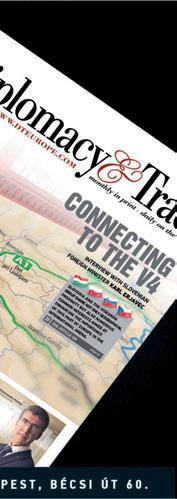
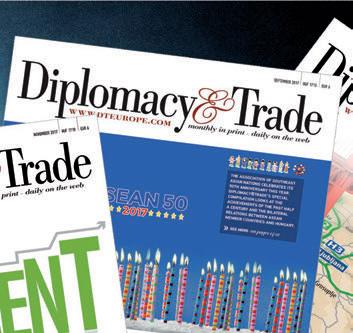
wine
Hungarian viticulturist Vilmos Thummerer’s 2019 Egri Chardonnay Battonage has won a precious gold medal at the Chardonnay world championship in France.
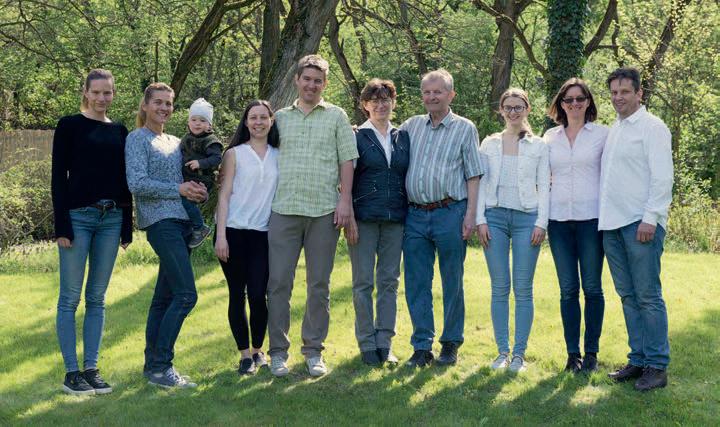
Chardonnay du Monde is an international wine competition where the world’s best Chardonnay wines are assessed. The organizers invite the best winemakers from all over the world to enter their Chardonnays in the competition. This year’s Chardonnay du Monde took place in March and 604 wines from 36 countries were evaluated by the judges. It was at this prestigious event that the Thummerer Chardonnay was awarded a gold medal, a recognition that no other Hungarian winery managed to achieve before.
“What makes this result particularly precious to us is the fact that the standards at Chardonnay du Monde are much higher than at other competitions and therefore, its awards are among the most prestigious in the world of wine,” the founder of the winery, Vilmos Thummerer highlighted after the announcement.“It really made me happy that the results of Hungarian wines are outstanding even by international standards: having won nine medals, Hungary finished fourth in the medal table behind France, Switzerland and Canada. This is a highly welcome recognition for Hungarian winemakers as it came after a difficult year that made all of us yearn for some success. I believe that we have every reason to feel proud,” he added.


A wine of real stature



Antal Kovács, Hungary’s perpetual sommelier champion has given the following description of the gold medal winning Chardonnay, that goes by the name ‘Egri Chardonnay Battonage 2019, Thummerer Pincészet’ (Eger Chardonnay Battonage 2019, Thummerer Winery):
“Golden yellow color of medium intensity. The nose displays tropical fruits and juicy grapes frameworked by elegant oak notes and also spices deriving from battonage [that is, lees aging and stirring]. The tightly knit palate is dry with balanced acidity, creamy texture, gentle alcoholic heat, complex dried fruit flavors and a finish that seems to go on forever.
A wine of real stature and at the same time, the most outstanding representative of the variety in Hungary. This is a young Chardonnay taking its first steps towards evolution with many years of ageing ahead. One should lay down a case or two as its present state clearly indicates that this is a wine of great potential that will keep developing and display new facets as the years go by. A wine for connoisseurs looking for sophisticated delights.”
The Eger Chardonnay Battonage 2019, Thummerer Winery is recommended to be served at 13-14 °C. The wine is a great match for fish and poultry dishes with creamy sauces, pasta with mushroom or roasted pork dishes.


www.dteurope.com |DIPLOMACY & TRADE| APRIL 2021 23 photo by THUMMERER WINERY
THE WINNING WINE IS THE MOST OUTSTANDING REPRESENTATIVE OF THE VARIETY IN HUNGARY
PAYMENT BANK TRANSFER Account No: Unicredit Bank 10918001-00000106-89200006 Please, invoice me at the address: Date: Signature: Buyer: VAT Number: Address: Name: Phone: E-mail:
HEALING FOR THE BODY AND THE SOUL
We are a private hospital offering a range of services from obstetrics, to pediatrics, over 40 medical specialities, state-of-the-art operating rooms, exclusive surroundings and patient accommodation to meet all your needs. We provide annual packages, medical screenings and corporate health services, as well as attentive care and a kind smile. The one thing you won't find at Dr. Rose is a waiting list. All this is available locally, in Budapest, Hungary.
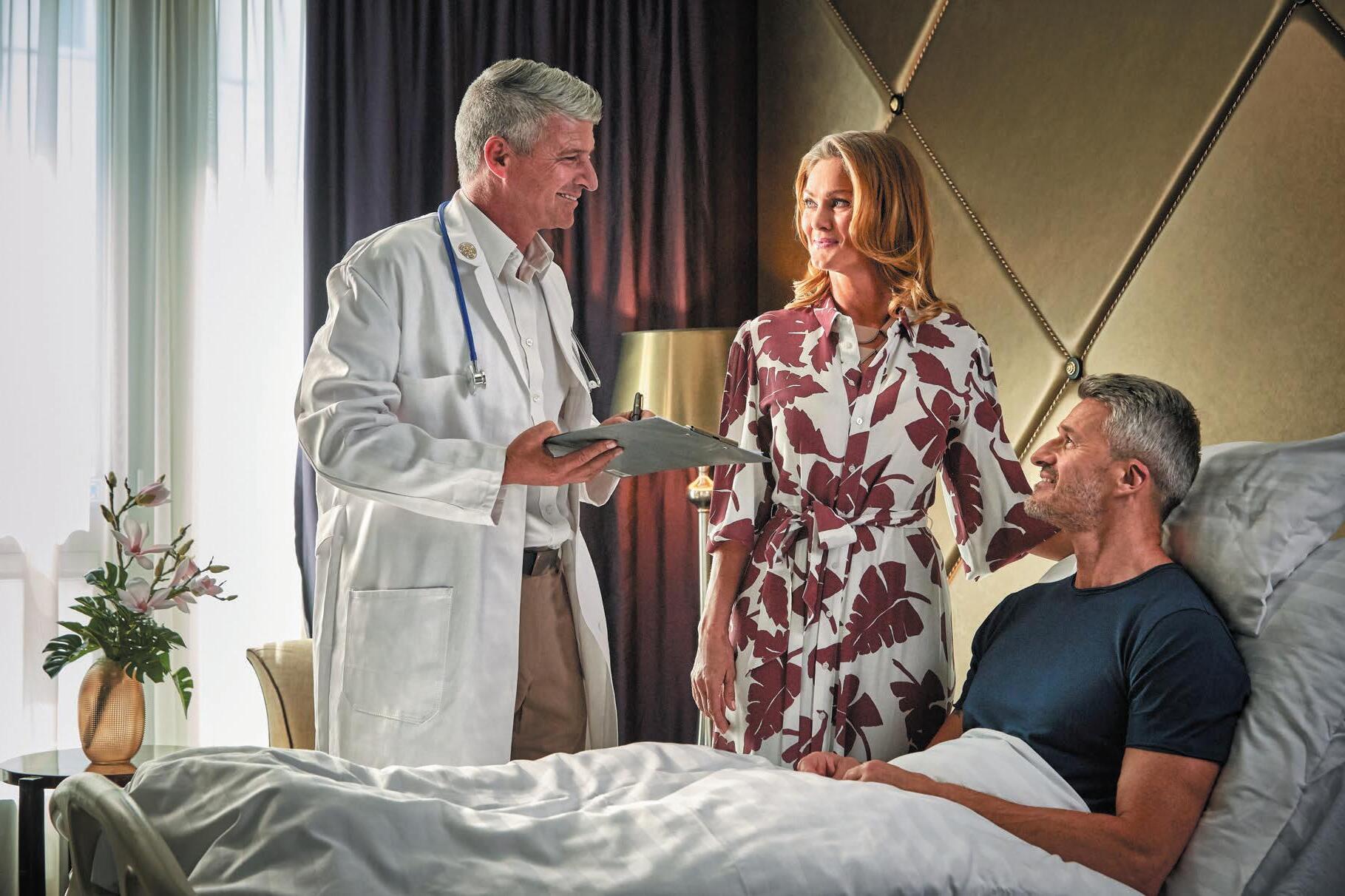
7/8 Széchenyi Square 1051 Budapest Tel.: +36 1 377 6737 www.drrose.hu EXCELLENCE IN HEALTHCARE
































































































































































































































































